#and that makes alex a relatable character overall and makes the pacing of the story better‚ which is why Most queer authors tend to do this
Explore tagged Tumblr posts
Note
hey sara when you read rwrb did you also assume alex knew he was bi up until his sexuality crisis revealed the truth to you or was it just me who labored under delusions for the first 25 percent of the book, a whole quarter of the way through, before getting the shocking surprise that alex claremont-diaz, main character of nyt bestselling debut novel red white and royal blue, by author casey mcquiston, was NOT an out and proud bisexual man?
no actually, because im not delulu like u are . anyway .
#LMAO theres a pattern to how these books work and only occasionally are Both ppl comfortable in their identity before getting together.#bc queer panic is fun to write and also a convenient plot point to maybe add Angst or just further the Getting Together process.#besides‚ the whole point was to have a Major Big Realization that his obsession w henry wasnt purely antagonistic.#and it made for some good dramatic irony and unreliable narrator shenanigans. so im saying that it was the only way to fill up space.#and also it caused introspection‚ which leads to us learning more backstory and empathising with him more in general.#also it was hilarious that alex was high key obsessed with him for years and also had Gay Experiences in hs but still didn't realize.#and that makes alex a relatable character overall and makes the pacing of the story better‚ which is why Most queer authors tend to do this#so basically for technical reasons that i Knew bc i do literary analysis‚ also in the specific case of rivals to lovers it just made Sense.#sara's asks#rori <33#rwrb
7 notes
·
View notes
Text
Immersive Sebastian dev update...
v3.0 (AKA the BIG ONE) in progress! I learned a lot of cool things coding Immersive Sam (which will be freakin' awesome, if I do say so myself), so after I release that in about a week, I'll come back to my guy Seb and add these fun features. No projected ETA, I want to take my time with it and make it as good as possible. All I'll say is it'll be before Christmas. (all of the below will be included in Sam's mod on release)
Wedding events, an overall expanded engagement/wedding experience!
Dialogue expansion for Maru, Robin, Demetrius and Shane, likely more Sam and Vincent lines as well.
Story crossover between Sebastian and Sam, they are best friends after all and it makes sense. Additional banter and teasing between the core friend group characters (Seb, Sam, Abby, Alex, possibly Haley).
Adjust timeline and triggers to scale automatically to the player's pace, adding alternate dialogue for 8 hearts based on relationship status: friends vs. dating.
Add cutscenes (Easter Egg mini-events) These scenes are progressive, building off each other. For example, see a small cutscene in Spring, see the same one in Summer but with more content, again in Fall with still more content, and so on.
Add conversation topics related to events, pulling more characters into the story and connecting related stories.
Add post-marriage mini story arcs that take place over a few weeks and end in a mini cutscene, triggering the next story.
Repeatable events option for some events, not sure which ones but I've been asked to make a few repeatable. Possibly add variations so the repeat is slightly different and have them trigger once a year.
More Extra Spicy content for marriage, plus a couple of events if I can think of some unique scenarios. Suggestions welcome! Message me if you don't want to put your totally horny suggestion in the comments, I won't judge. haha!
Clean up and improve animations in current events.
As always, suggestions and feedback are welcome!

#stardew valley#stardew mods#maggs immersive sebastian#maggs immersive sam#stardew 1.6#stardew sebastian#stardew sam
28 notes
·
View notes
Text
Hollowed Minds Progress Update 5/08/23
Hi! I know I failed at making a progress update last month, so first of all, apologies for that! Things have just been busy tbh and life has been too stressful that at some points I just couldn't write. It's why I've been a bit inactive here as well, and why I've been barely answering the asks I've been receiving.
I cannot report yet how many words I've written for the update so far because I haven't really taken a look at it myself, but I will do so at the end of the month if there's still no confirmed schedule by then. My eye health has just been very consistent at making my life harder as well until recently, and here's hoping I'll at least be able to function properly for a whole month🤞
Some things that will be in the next update:
For Chapter 2's Part 2:
Everything still goes as planned, except now both routes are expected to be fast-paced and action-oriented, though one is still more intense than the other.
This will be a massive one, not because of the word count but because of the variations that will play out. There won't be much issues in arranging the transitions to Chapter 3, so there's at least that, but your choices will matter a lot. So you might have to be careful with them.
One of the routes gets Alonzo actively involved, but please be assured that this doesn't mean you have to romance them. I actually encourage you all to check out both routes once they come because you'll gain more discoveries that way. 👀
Alonzo's route will be so memeworthy, I have to admit. Please try it.
There's an info dump in Chapter 2's Part 1 that I'm not really a fan of, so I'll be moving some of those to this part instead if needed.
For the overall IF:
Alex will now have a set skin tone if a lighter one is chosen for the Ripper. I will discuss this in detail soon, but I just wanted to emphasize that Alex and Ripper's mother are canonically PoC.
You will have options for your Ripper to wear contacts or glasses (or neither ofc).
You'll be able to bring a weapon with you in Chapter 2 depending on your choices so far.
You might remember a section of Chapter 1 where you can choose what your Ripper had been doing for the duration of the five months. I might reduce it to a few, just so I could have them properly recognized in the story.
There will be a couple of changes in the character descriptions in the game's stats page, with plans to make them shorter, too, for easier readability.
I will make sure you'll have saves at the end of this. So please don't be surprised if there'll be more page breaks in the future, as well as more choices (that are still as meaningful.)
In connection to above, I also plan to make the in-game descriptions snappier and easier to read while still maintaining the quality they should have. Your feedback will be very important for this, and this also applies to the beta testers (sorry I've been so silent. I swear I'll get back to you all soon lmao)
Not really too related here, but I also plan to be more consistent with my updates in the future. It's just that my irl schedule is still a huge mess, and it's very hard to be consistent when that happens.
Just a last piece of my mind. Some anons have been very aggressive with harassment the past few months, and I really have no interest for more drama right now. So if you have issues, if you think you can back your own words, send them through a DM or at least turn off anon so we could have a proper conversation.
It's honestly tiring. Being an Asian in this community can already be so tiring, so I am begging people to be mature and responsible with their words. After all, I've repeatedly said that you can always come to me with your concerns or whatever you have against me. As long as we can actually talk about it.
Anyway, that's all, and I hope the week will be good for everyone :) I have a few more things to post on Patreon tomorrow, so if you're a current patron, do look forward to that!
#hollowed minds series#interactive fiction#hollowed minds#wip#writing#hollowed minds book one#if wip#interactive novel#hollowed minds progress update#progress update#interactive game#if game#cyoa
68 notes
·
View notes
Text
so here’s the thing about the red white and royal blue movie
PSA BEFORE WE BEGIN!!! I AM NOT HATING! i did like the movie, this is not me hating on it or casey mcquinston, any of the actors, producers, writers, etc. i personally think that casey is an insanely talented writer, and the actors did a phenomenal job bringing this story to life. i am simply sharing my opinion and what i would change about it! also i like to complain it is my natural instinct. now that that’s out of the way here we go
honestly i think they could have done better and we could have gotten a lot more. sososo much was left out from the books and i was honestly just disappointed by how much they changed or straight up removed entirely. we were ROBBED of the following:
• JUNE I MISS HERRR WHERE IS SHE WAAAAH
• alex’s parents being divorced and how that effected him as a person and helped him grow into the person he is
• alex’s self discovery in his sexuality
• liam and rafael luna and how they both also helped alex in discovering his bisexuality (who the fuck is miguel) (did not like that he was already bi, his path of self discovery throughout the book is really relatable and good rep imo but idk)
• the iconic cornettos scene (i know they filmed it it was is the fucking trailers WHERE DID IT GO)
• bea’s 🍃 scandal/‘powder princess’ and how much that contributes to her development and depth as a character
• BEAS FATTY FUCKING CAT WHAT IS HIS NAME I MISS HIM
• the physical presence of the emails and how vulnerable alex and henry are with each other in them and how much they reveal about not just the 2 of them but other characters too like bea and the rest of henry’s family (they just has voiceovers which i thought was kind of weird, maybe just me)
• henry talking to the cancer patient about at at wars and that whole adorable thing
• seeing alex storming the palace to talk to henry (he just appeared?? smh anyways)
• most of alexs persepective of the emails getting leaked
• the ENTIRE fake dating arc with alex/nora and henry/june (i think? read the book a while ago don’t fully remember)
• alex’s whole dilemma and eventual decision to go to NYU law
• ZAHRA AND SHAANS ENTIRE RELATIONSHIP BASICALLY!! (why weren’t they engaged)
• the historical love letters henry and alex quoted in their emails to each other
• most of the plot with the richards campaign (mostly to do with the fact that there is NO LUNA)
• overall a lot of the buildup/enemies to lovers aspect of alex and henry’s relationship
there’s probably so much more that i’m forgetting but THE POINT IS there were so many important little details from the book that was left out in the movie that i would have loved to see and it’s honestly just disappointing that we didn’t get those. it felt like they basically got rid of everything that didn’t have to do with alex and henry’s relationship which just made the movie feel very one dimensional and bland to me. the whole film just felt overall really lacking of what made me love the book so much in the first place.
now i am going to be a tad bit hateful when i say the pacing of this film is HORRENDOUS. it was so fast paced and really just did not flow at all like the he book did. a great example of this i think would be the bar scene. when i read that in the book, it felt like a really long and detailed scene, but in the movie it’s a short maybe 60 second long montage which honestly just does not do such an eventful moment from the book justice.
to be entirely honest i feel like the book would have done a lot more justice if it had gotten a tv show adaptation instead of a film. unfortunately movies have a time limit, and amazon made them cut the originally 3+ hour film down to 2 hours or less. with tv shows on the other hand, they can make multiple shorter episodes, resulting in a longer total running time, therefore giving much more time for the smaller details (listed above) that aren’t detrimental enough to the plot to keep in a limited 2 hour long maximum film, but important enough to be kept in a, for example, 8 episode long tv series, 30-45 mins per episode. it doesn’t make sense to me why it wasn’t a tv show in the first place, since it is produced by prime video, whose most popular thing rn is the summer i turned pretty, which is LITERALLY A BOOK TO TV SHOW ADAPTATION!!!!!
to put it simply, it is impossible to fit 10 hours worth of words into a 2 hour long movie, so i understand why they had to remove so many details, but as a diehard book fan it is still disappointing to not see little things like that portrayed on the big screen.
i think that the moral of the story is that books should never be made into movies and instead always be made into tv shows and we deserve the 3 hour uncut version and amazon hates gay people
thank you for coming to my ted talk
#red white and royal blue#alex claremont diaz#prince henry of wales#red white and royal blue movie#rwrb#rwrb spoilers#rwrb on prime#prince henry rwrb#rwrb film#rwrb book#june claremont diaz#tragic little gay men#lgbt books#history huh#ellen claremont#rwrb alex#rwrb henry#movie opinions#lgbtq#bisexual#taylor zakhar perez#nicholas galitzine
22 notes
·
View notes
Text
BK88: An In-Depth Look at the Movie
In the world of cinema, action and thrillers hold a special place. One such captivating movie is "BK88." This film takes viewers on a wild ride through the dangerous world of underground gambling. In this article, we will explore everything about "BK88," including its plot, characters, trailers, ratings, user reviews, box office performance, awards, release dates, streaming availability, and related films. Let’s dive into the exciting details!
Synopsis of BK88
"BK88" is a gripping action thriller that focuses on a young man named Alex. He is an ambitious person who wants to make quick money. To achieve his dream, he enters the world of online gambling through a platform called BK88. At first, Alex enjoys the thrill of winning and the excitement that comes with it. However, as he gets deeper into this risky lifestyle, he begins to realize that the world of BK88 is not what it seems.
The movie does a fantastic job of showing the highs and lows of gambling. Alex faces numerous challenges, including betrayal by friends, unexpected losses, and moral dilemmas that test his character. The film keeps you on the edge of your seat as Alex navigates this dangerous world, making tough choices that affect his life and the lives of those around him.
Movie Details
Understanding the basics of a movie helps viewers appreciate it more. Here are some key details about "BK88."
"BK88" is directed by John Doe, a talented filmmaker known for his ability to create tension and excitement. The screenplay is written by Jane Smith and Mark Johnson, who have worked together on several successful projects. The film was released on June 10, 2023, and falls under the action and thriller genres.
With a runtime of 120 minutes, "BK88" provides a well-paced story that keeps the audience engaged throughout. The film is in English and was produced in the USA.
Trailers and Clips
The marketing team for "BK88" did a great job promoting the movie. Several trailers were released before the film hit theaters. The trailers are filled with exciting scenes that showcase the film’s action and emotional moments.
In one of the trailers, viewers see Alex winning big at a poker table, surrounded by friends. The excitement is palpable. However, another trailer reveals the darker side of gambling, where Alex faces danger and betrayal. These clips help to create anticipation and interest among potential viewers. You can find these trailers on popular platforms like YouTube, where they give a sneak peek of what to expect from the movie.
Ratings and Scores
When a new movie comes out, it is common for critics and audiences to share their opinions. "BK88" has received a mix of reviews, and ratings provide an insight into how well the film is perceived.
On Rotten Tomatoes, "BK88" has a score of 75 percent. This rating indicates that a majority of critics enjoyed the film. IMDb, a popular movie database, gives it a score of 7.2 out of 10. This score shows that viewers generally liked the movie but had some mixed feelings. Metacritic, another review aggregator, rated "BK88" at 68 out of 100. These ratings suggest that while "BK88" has its strengths, it may not appeal to everyone.
User Reviews and Comments
User reviews are an important part of understanding how a film is received. People who watch "BK88" have shared their thoughts online. Many viewers enjoyed the action and found the storyline exciting. For instance, one viewer named John said that he loved the adrenaline rush the movie gave him. He felt like he was part of Alex’s journey. Another viewer, Lisa, commented on the strong acting but wished the characters had more depth.
Raj, a fan of thrillers, mentioned that "BK88" kept him on the edge of his seat. He recommended it to anyone who enjoys action-packed films. Overall, user reviews show that while many people loved the movie, some felt it could have been improved in certain areas.
Box Office Information
Box office performance is a crucial aspect of a film's success. "BK88" had a strong opening weekend, earning $10 million. This initial success helped the movie gain traction. As the weeks went by, the film continued to perform well, ultimately grossing $45 million. The production budget for "BK88" was $20 million, making its box office success quite impressive.
The marketing team’s efforts paid off, attracting a large audience to theaters. This financial success indicates that "BK88" resonated with viewers and enjoyed a solid run.
Awards and Nominations
Awards are a way to recognize the hard work that goes into filmmaking. "BK88" received several nominations and awards since its release. At the Academy Awards, it was nominated for Best Action Feature, which is a significant honor. Additionally, the lead actor received a nomination for Best Actor at the Golden Globe Awards. The film also won an award for Best Editing at the Critics' Choice Awards.
These accolades reflect the movie's quality and the talent of those involved in its creation. The nominations and wins showcase the film's impact in the industry and among audiences.
Release Dates
"BK88" premiered in theaters on June 10, 2023. The release was highly anticipated due to the buzz generated by its trailers and marketing. Following its theatrical run, the film became available for streaming on various platforms.
On July 10, 2023, "BK88" was released on Netflix and Amazon Prime Video. This allowed more viewers to enjoy the film from the comfort of their homes. The release dates played a crucial role in the movie's success, ensuring that audiences could access it through different means.
Streaming Availability
With the rise of streaming platforms, many viewers prefer watching films at home. "BK88" is available on several popular services. After its theatrical release, it became accessible on Netflix and Amazon Prime Video.
This availability has made it easy for audiences to watch "BK88" whenever they want. Streaming allows for convenience and flexibility, attracting viewers who might not have had the chance to see it in theaters.
Related Movies
If you enjoyed "BK88," there are several other films you might like that share similar themes. One such film is "Rounders." This movie follows a law student who gets involved in high-stakes poker to pay off a debt. It combines drama and gambling, just like "BK88."
Another related movie is "Casino." This classic film tells the story of greed, power, and corruption in the Las Vegas gambling scene. It offers a deeper look into the world of gambling and its consequences. Lastly, "21" focuses on a group of students who use card counting techniques to win big in Las Vegas.
These films provide thrilling stories and insights into the gambling world, making them great companions to "BK88."
Conclusion
"BK88" is a thrilling action film that takes audiences on a rollercoaster ride through the dangerous world of gambling. The movie features a captivating storyline, strong performances, and impressive production values. It successfully explores themes of ambition, betrayal, and the moral dilemmas faced by its characters.
As we have seen, the film has garnered positive ratings, user reviews, and notable awards. Its box office success demonstrates its appeal to audiences. Whether you choose to watch it in theaters or through streaming services, "BK88" is sure to provide an engaging experience.
If you enjoy action-packed thrillers, make sure to check out "BK88." It is a movie that will keep you entertained and thinking long after the credits roll.
0 notes
Text
Todays ranking
Top to bottom
Evil dead
Crooks
Rats Aca Demy
Bite
Evil dead- 8/10
It’s well produced. I love a set that moves. Picture frames, puppets, set pieces. I especially liked the chair mouth and the moose. I also love maximalism, everywhere you looked was something! It’s my first time seeing the shadow being used to depict violence and I enjoyed that a lot. Music was good, acting was good. I thought pacing was good also because lots of movement was meaningful and engaging. I love horror, comedy, and musicals. But I don’t like getting sticky not fun minus 2 points. But it’s very good for a bunch of hs-ers
Rats Aca Demy- 8/10
It was perfect actually. Costumes and makeup were amazing. Audience participation, call and response is welcomed always. Plot was very nice. I’m not always into anything dramas but it was also funny so that always makes things better. Pacing was a little slow because of the audience participation tho. Like it is fun to do, but it felt a little too much at times. Like get on with the story which brought the entertainment value down a tad. I enjoyed the plot of this one more than evil dead. They set up a clear progression/plot points that they hit clearly as well. We all understood the assignment with more than enough time to sit with. It’s lower than evil dead by superficial reasons,, I love comedy AND musicals a little more. Categorically a musical has to really tank to not be above a play. Or a play has to be extraordinary to be on top.
Crooks- 7/10
Slow start, but once it started it kept on rolling. Ending was excellent. It had my favorite plot. It was funny and corny and also drama filled which isn’t always my favorite but the story was interesting to me. Like certain topics are usually big turn offs for me so when the dark material was murder and drugs I was relived and refreshed. Had my favorite character of the day. I loved every bit but the beginning of the play. It is placed higher on the list but rated lower because I was entertained more consistently with crooks but rats was more polished. Crooks was more charming though and I value charm!!
Bite- 5/10
When you think of a show by the local theatre group you see bite. Its flat seating made it difficult to watch, but not their fault. The acting was the worst of the shows, but they are very passionate. Live music is always more points. Low budget set is just show business finesse baby. A handful of excellent highlights lets them hold their head up at the end of the night. Alex’s pirouette, 12 year olds scream and major emotional moment!!, Ellie’s girlfriend in real life??, and that other guy I’m sure did something other than sweat. A lot of Alex’s bits were good and personally relatable. He’s a funny guy. There delivery was very much hs theatre reciting lines, but there were moments of embodying the character that I appreciated. A More relaxed voice that felt more like a reaction to another characters lines than just trying to get through the scene. I think it is definitely the standard show you’d expect. You go into it curious with low expectations and then go huh! That was different than I would have expected it, but it was also good or ok. Also the addition of a they/them character who looked normal and was normalized is refreshing. It’s the apocalypse babe, no time for coming out stories
Overall
Any scene with red lighting was my favorite, love seeing the descent of the psyche
I found my fringe, it’s pathetic stupid stupid men I guess
,, there’s a time and place for social commentary or political pieces for sure but not for this, not for $20
Lemonade is good, sorry
Lying is part of the festivities
In addition we will start going for first row if possible over middle seats in the seccond. We are just too little man
0 notes
Text
Ghostlight Review: A Journey Through Grief and Healing

Ghostlight directed by Kelly O'Sullivan and Alex Thompson from a screenplay by O'Sullivan, is a contemplative drama that delves into the profound themes of grief, guilt, and the healing power of art. The film stars Keith Kupferer, Dolly de Leon, Katherine May Kupferer, and Tara Mallen, portraying a family grappling with the aftermath of a tragic loss. The Story: A Family Shattered by Tragedy The narrative centers on Dan Mueller (Keith Kupferer), a construction worker struggling to cope with his son Brian's suicide. Dan's life spirals into chaos, marked by stress, the disciplinary issues of his teenage daughter Daisy (Katherine May Kupferer), and a wrongful death lawsuit against Brian's ex-girlfriend, Christine Hawthorne. Kupferer's portrayal of Dan captures the raw, often unspoken pain of a grieving father, making his character deeply relatable and human. The story centers on Dan Mueller (Keith Kupferer), a construction worker struggling with the aftermath of his son Brian's suicide. Dan's life is a chaotic whirlpool of stress, intensified by the disciplinary issues of his teenage daughter Daisy (Katherine May Kupferer) and a wrongful death lawsuit against Christine Hawthorne, Brian's ex-girlfriend. The weight of his grief and guilt is palpable, coloring every aspect of his interactions and decisions. Kupferer's portrayal of Dan is nuanced and deeply human, capturing the raw, often unspoken pain of a grieving father. https://www.youtube.com/watch?v=R1TycuGX4Mw The Good: A Journey Through Grief and Art Dan's life takes an unexpected turn when he meets Rita (Dolly de Leon), an actor at a community theater. Rita invites Dan to read for the role of Lord Capulet in their upcoming production of Romeo and Juliet, setting him on a transformative journey. De Leon's Rita adds warmth and eccentricity to the film, and her interactions with Dan are among the film's most compelling moments. Daisy, once an actor, becomes integral to Dan's healing process. Initially reluctant, she finds herself drawn back into the theater world, which offers her a semblance of connection and purpose. Katherine May Kupferer's performance as Daisy is a standout, skillfully balancing teenage angst with deep loss. The evolving father-daughter relationship provides some of the film's most poignant scenes. Sharon (Tara Mallen), Dan's wife, adds another layer of complexity to the story. Her attempt to cope by building a garden over the site of Brian’s suicide contrasts sharply with Dan's methods, creating familial tension. Mallen's portrayal captures the desperation and helplessness of a mother dealing with her grief. One of Ghostlight's strengths is its portrayal of art's healing power. The theater serves as a sanctuary for Dan, offering a space to confront his pain and find catharsis. The scenes of Dan rehearsing and performing in Romeo and Juliet are beautifully intertwined with his personal journey, adding depth to the film. Visually, the film employs a muted color palette and effective use of lighting and shadows to reflect the somber mood. The theater scenes, in particular, stand out for their intensity and the magic of live performance. The supporting cast, including Hana Dworkin, Tommy Rivera-Vega, Alma Washington, H.B. Ward, Dexter Zollicoffer, Deanna Dunagan, and Francis Guinan, enrich the narrative with their unique contributions. Ghostlight powerfully explores the varied ways individuals cope with grief, illustrating that healing is a complex and personal journey. The Bad: Pacing and Dialogue Issues While Ghostlight resonates emotionally, it is not without flaws. The pacing can be uneven, with some subplots feeling underdeveloped. Additionally, there are moments where the dialogue comes off as stilted and overly theatrical, detracting from the film's naturalistic tone. Overall: A Thought-Provoking Drama Ghostlight is an emotionally resonant film, thanks to strong performances and thoughtful storytelling. Keith Kupferer anchors the film with a portrayal that is both raw and tender, supported by excellent performances from Dolly de Leon and Katherine May Kupferer. The film handles themes of grief, guilt, and the redemptive power of art with sensitivity and insight. Despite its flaws, Ghostlight offers a compelling look at a family's struggle with loss and their journey toward healing. It is a poignant reminder of the power of storytelling, both on and off the stage, to heal, connect, and transform. Read the full article
0 notes
Text
Final Outcome Light and Shadow Reflection
As I was ill over the Christmas break I had very little time to lose, this meant I needed to plough ahead to complete my films. The first film I completed was the Oog Ooga Ooog Ooog film.
vimeo
I'm really happy with how this film turned out, I think the introductory section of the tree exploding and the cavemen inside the cave could be expanded upon to improve the overall flow of the narrative but I think this stands well as a completed narrative. I took the time to correct many of the line breaks which I discussed with Alex and maintained the humour which I had worried could be lost through the change in pacing.
As far as answering the brief goes I feel I was successful. Lighting is used to draw attention to characters and their relation to fire. It is also used to emphasise moments in the narrative, for example the first time we see the fire. The use of shadows and dark tones throughout this project allowed the white lighting and bright neon fire to pop and this gave it a lot of strength in the story. Animated backgrounds were used for some of the shots to create more dynamic lighting and make the fire believable. Overall I think my use of lighting as a tool was successful in serving the story I was trying to tell.
As mentioned the start feels a bit bland and if I had more time I think I would set the scene of the cave with shots of the outside world contrasted against the cave, maybe using an insect moving around the world or something as a macro perspective. I think that I prioritized the right thing in making the ending section as good as it can be as if the ending was flat, no matter how good the setup was the film would still suck.
Visually I think this is my strongest project. The contrast and rim lighting helps bring out the characters from the dark backgrounds and the shading gives the world depth. The only visual change I would make is using the original texture style but ultimately that is a lot of work, time and effort... for not much of an improvement so I am happy I decided to go with this simplified shading style. The rim light colour is really nice looking, it gives an almost neon aesthetic to the whole animation and helps establish the characters positions in relation to the fires.
I am not really happy with the consistency of my backgrounds as this is something which had to suffer to meet deadlines and going forward ill try to either use fewer backgrounds or simplify them more.
Overall I think I succeeded in what I set out to create, a "haha cavemen say oog and are scared of fire in the dark" type of comedy film which used light and shadow to emphasise the power of nature and the absurd interaction between cavemen and fire/lightning.
I'm really happy with how this film turned out, I think the introductory section of the tree exploding and the cavemen inside the cave could be expanded upon to improve the overall flow of the narrative but I think this stands well as a completed narrative. I took the time to correct many of the line breaks which I discussed with Alex and maintained the humour which I had worried could be lost through the change in pacing.
Bibliography of assets used (Audio).
The cover of "What a Wonderful World" was recorded by my good friend Serafin Schroff specifically for this film. I also paid for a karaoke version of the song to use in the future if I am unable to buy licencing rights for this cover of the song and want to use it outside of the MA submission.
This includes assets not used in the final cut, all versions and animatics are covered in this list.
Electric_zap_001 | royalty free music - pixabay (no date). Available at: https://pixabay.com/sound-effects/electric-zap-001-6374/ (Accessed: January 22, 2023).
Fire | royalty free music - pixabay (no date). Available at: https://pixabay.com/sound-effects/fire-6699/ (Accessed: January 22, 2023).
Heavenly-army | royalty free music - pixabay (no date). Available at: https://pixabay.com/sound-effects/heavenly-army-24611/ (Accessed: January 22, 2023).
HQ Explosion | Royalty Free Music - Pixabay (no date). Available at: https://pixabay.com/sound-effects/hq-explosion-6288/ (Accessed: January 22, 2023).
Large fire burning Sound FX (2022) YouTube. YouTube. Available at: https://www.youtube.com/watch?v=R5dWNMBDHXI (Accessed: January 22, 2023).
Munching food | royalty free music - pixabay (no date). Available at: https://pixabay.com/sound-effects/munching-food-73994/ (Accessed: January 22, 2023).
Owl Hooting | Royalty Free Music - Pixabay (no date). Available at: https://pixabay.com/sound-effects/owl-hooting-48028/ (Accessed: January 22, 2023).
Rain & Thunder Sound Effect - Short (5 minutes) (2016) YouTube. YouTube. Available at: https://www.youtube.com/watch?v=4cI5PCGMAGE (Accessed: January 22, 2023).
sound of thunder and lightning effect (2022) YouTube. YouTube. Available at: https://www.youtube.com/watch?v=5HZfMHE_xaM (Accessed: January 22, 2023).
Thunder Sound effect (2012) YouTube. YouTube. Available at: https://www.youtube.com/watch?v=T-BOPr7NXME (Accessed: January 22, 2023).
Thunderstorm | royalty free music - pixabay (no date). Available at: https://pixabay.com/sound-effects/thunderstorm-14708/ (Accessed: January 22, 2023).
Tribe drum loop | royalty free music - pixabay (no date). Available at: https://pixabay.com/sound-effects/tribe-drum-loop-103173/ (Accessed: January 22, 2023).
Whoosh the edge | cinematic trailer sound effects (no date). Available at: https://pixabay.com/sound-effects/whoosh-the-edge-cinematic-trailer-sound-effects-125410/ (Accessed: January 22, 2023).
2 notes
·
View notes
Note
I loved your recent post about Marty and his ADHD! It was soo spot on. And, I saw in the tags that you mentioned Alex Keaton and how you believe he’s not neurotypical either. Care to elaborate? Do you have any headcanons about neurodivergent™ Alex? I’d love to hear your thoughts! :)
Oh, hey, thank you! Marty having ADHD seems to be one of the most common headcanons in the fandom, so that post was a lot of fun to work on.
As far as Alex goes...yes, I will elaborate, BUT I'm putting it under a cut because ya girl is really going to E L A B O R A T E.
I've mentioned before that I think Alex's overall personality/demeanor comes from a variety of different places. Some parts of who he is are likely caused by all the pressure put on him to be a high achiever, due to being so academically gifted from a young age. Other parts are due to being overly coddled and spoiled by Elyse and Steven. Still, there's probably a part of Alex that genuinely enjoys being difficult and getting a rise out of people. Then, there's the obvious anxiety he struggles with, which even MJF has talked about in some interviews when discussing how he approached playing a guy like Alex.
"Giftedness" & anxiety are already included under the umbrella of neurodiversity but in Alex's case, I actually think there's even more to it than that. Yeah, Alex is a funny character whose actions/words are so often played for laughs. He can also be a really irksome character when he's dishing out the sarcasm and being selfish. But I also can't help but look at Alex and think, This guy is just so not NT and he is struggling, somebody Help Him. And since Alex P. Keaton is one of my favorite characters AND I love to analyze/ do deep dives AND the topic of neurodiversity is a particularly strong interest of mine... well, here you go....
Mans is autistic.
• Difficulty with social cues and "reading the room". Seriously, there are so many instances of everyone around him all being on the same page about something or dealing with something serious, and Alex walks in and just proceeds to miss every single cue people throw his way. Two scenes that pop into my head, in particular, are the Reflective Pajamas one and the Clam Puff one, lol.
• He frequently struggles with putting himself in other people's shoes: Alex is certainly shown to be a compassionate person. He can recognize when people are hurting and will do the right thing, but sometimes he needs some help to get there. It seems that a lot of the time, all he knows is how he feels or thinks about something, and it doesn't occur to him that another person could be experiencing it differently. Then, once Steven, Elyse, Ellen, etc, break the situation down for him and explicitly say things like, Hey, that person's feelings are hurt because... or Here is the exact reason this person is angry... Alex is finally able to connect the dots, which usually leads to him being like, I hadn't ever thought about that/ I didn't mean it. (Of course, there are also times where Alex is just purposely being a jerk, but I'm not focusing on those)
• Specific, intense interests: Politics & economics, obviously. It's made well-known that Alex has been completely fixated on these two areas since he was a toddler. He's prone to enthusiastic, overly detailed discourse on the topics and either doesn't care or can't pick up on when people are growing bored at listening to him.
• Also, can we talk about how it's established that Alex's favorite toy as a little kid was a box? Like, he carried it everywhere, played with it, slept with it, and was devastated when it fell apart. Idk, I know kids can be attached to random objects, but it's just interesting that Alex is noted as having been enamored with a box. I'm just picturing little Alex, ignoring all the toys he has in favor of just sitting and staring at a box, and his parents are like, Yeah, this is normal.
• Highly intelligent, bordering on genius/prodigy (He was doing long-division at like, 3 years old) but has difficulty connecting with peers & making friends: This is most prominently shown in "A, My Name is Alex," where we see glimpses of various events in his childhood. In the scene where Alex meets Greg, we learn that Alex spends recess inside, helping the teacher plan her lessons rather than going out to socialize with his classmates. He's bewildered at Greg's invitation to come play, meaning he likely spent the majority of his childhood on his own due to being considered an outcast by his peers and just generally relating more easily to adults. (He also mentions taking night classes at a local college at age SEVEN. So like. If the long-division story and night class thing are taken to be actual facts of Alex's childhood...we're looking at something similar to hyperlexia/hypernumeracy here. This kid must have been bored out his mind having to sit through elementary school if he was that advanced)
• Very literal at times/ misses sarcasm: Interestingly enough, APK is very fond of being sarcastic but doesn't do so well when he's on the receiving end of it. Someone will make a joke or spin the sarcasm towards him for once, and he'll either just stare blankly like ???? or smile/thank them and they're like, Yeah, that wasn't a compliment, or, I was kidding.
• Black and white/ inflexible thinking: This might be the biggest one. Alex is super concerned with rules and ensuring that everyone is following them correctly. There's right and there's wrong, with no gray areas or middle ground as far as he's concerned. My favorite instance of this is in the episode where the family goes to visit Steven's mother and Rob, Alex's uncle, is telling a story of how Steven got in trouble as a kid for refusing to put his name in the upper right corner of his test papers. Everyone around the table laughs...except for Alex, who is deeply troubled by the information.


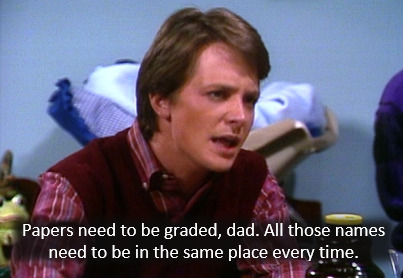
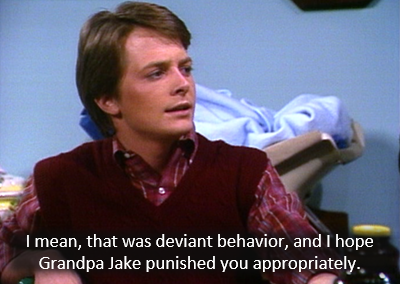
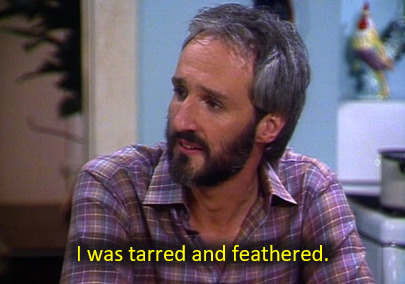
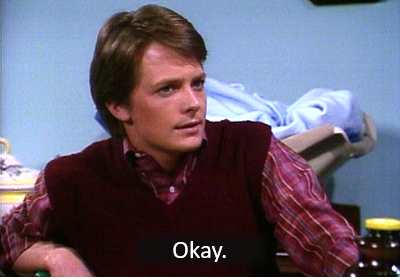
Just...Steven's delivery. The way he pauses and stares at Alex before replying with a ridiculous punishment that obviously didn't happen, but Alex shows no signs of being aware of or amused at the joke and is just glad his father faced the consequences of his actions. It's great, and a prime example of Alex's preoccupation with "the rules."
Another good example (& one that crosses into the empathy category as well) is "Big Brother is Watching", where Alex exposes a cheating scandal at school (that involves Mallory) and then can't wrap his mind around why everyone is angry at him when he gets the students who were involved suspended. He spends half the episode saying things like, But cheating is wrong. It's wrong and I told the truth about it. I did what's right. You (Steven) told me to always tell the truth, which I did. WHY PEOPLE ANGRY???
And so Steven has to basically spell it out and be like, You got those students suspended, Alex. They are upset with you because of this. They were exposed publically, which embarrassed them, and people tend to not like being embarrassed.
And Alex is like, Oh.
• Repetitive behavior/movements: Most often seen when Alex is distressed or scared, his mannerisms definitely stand out in many scenes. He paces, taps his foot/bounces his leg, rubs his hands together or over his lap, rocks back and forth, and avoids eye contact. I made a post about this a short while back because it really is interesting (and a testament to how well the character was played). There are moments where Alex is completely confident and "calm", and you can see that reflected in the way he carries himself. But whenever he's upset or anxious, you'll start to notice a variety of the things listed above.
So. Yeah. All these things considered...I headcanon Alex as possibly being autistic?? Which is not a take I've ever seen anyone else mention (and I seriously doubt anyone working on the show had this angle in mind at all) but watching through the series, my radar just goes off when it comes to APK.
I have no idea how this will be received. (If anyone even reads it because wow, this got away from me).
Thanks for the ask. As you may be able to tell, I enjoyed being able to spew out my thoughts.
#family ties#alex p keaton#apk#asks#do you see why it takes me so long to answer asks sometimes?#I'm out here writing an essay#I guess it's good that so few people I actually know watch/are fans of FT#because they would not have the option to keep scrolling and ignore me in situations like this#BUT! I was recently watching FT with someone who is new to the show#and I had said nothing about anything relating to this post or my thoughts here#after enough eps that they were able to get the full picture of Alex#they said ''You know...Alex could be autistic''#and I was like !!!!!!!! YOU SEE IT TOO
43 notes
·
View notes
Text
So, this is something that I’ve been thinking of doing for awhile. There have been a few new shows that I have been watching mostly because I enjoy the found family feels to them. Since today is Valentine’s Day, I figured I would post this list for the people who don’t want to see romantic love and rather focus on the platonic kind.
So, here we go:
The Owl House
Summary:
Luz is a self-assured teenage human girl who accidentally stumbles upon a portal to another world instead of going to Reality Check Camp. When on the Boiling Isles, which is made from the remains of a dead Titan, she befriends the rebellious witch Eda the Owl Lady and an adorably tiny warrior named King. Despite not having magical abilities and having to pose as a witch due to the prejudice towards humans, Luz pursues her dream of becoming a witch by serving as Eda’s apprentice at the Owl House and ultimately finds a new family in an unlikely setting. (copied from wiki)

Why I like it:
This is a new show and only about 5 episodes of it have aired so far, but I’m really enjoying it. The characters are fun, the world is both creepy and fun and we’re slowly getting into an actual plot but every episode so far has been useful in setting up more of this world. Also Eda is a badass character and is now becoming one of my favorite witch characters.
If you enjoyed Gravity Falls then I would definitely recommend this show since it has a similar humor and style, which isn’t surprising since Dana Terrace (the creator) worked on Gravity Falls and Alex Hirsch even does voices for two of the characters.
With that said, one of the minor things I like about this set up is that Luz the human girl isn’t stuck there. She does have the option of going home whenever she wants and her mother isn’t worried about her since she believes she’s away at summer camp. It’s nice not having that detail weighing over the character. Anyway, the found family vibes are just jiving in this show, and the characters are just fun.
Highly recommend.
Kipo and the Age of Wonderbeasts
Summary:
Kipo Oak, a thirteen-year-old girl, is searching for her father after being forced to flee from her underground city. To do so, she travels through an overgrown post-apocalyptic urban wasteland ruled by sentient mutant animals ("mutes"), together with her new friends Wolf, Mandu, Benson and Dave.(copied from wiki)

Why I like it:
I’m not usually one to go with post-apocalyptic stories, but this one has a very whimsical vibe which is more my jam. Kipo is a great character, but so is the rest of the cast. I love Kipo’s relationship with the jaded Wolf, but Bensen and Dave also add to the fun. (I will say for Voltron fans that Shiro and Wolf could relate in dealing with traumatic experiences).The world itself is very bright and colourful, but also has a very fun villain in Scarlemagne. He gives me mega Ratigan vibes if that’s any indication.
And one thing I appreciate is that the show does not bait people into thinking a particular ship is going to happen. Nope, this group is all family/friendship and I love it for it.
Add to the fact that this show has a terrific soundtrack and it’s a great watch.
Infinity Train
Summary:
Hard to describe the plot for this one without spoilers, but basically a girl named Tulip struggles to deal with her parents divorce and ends up on a mysterious train where each cart is it’s own mini world. Also, she gets accompanied by One-One a both happy and depressing robot, and the King of Corgis.

Why I like it:
Out of my recommendations this one is strangely probably the darkest of the four. It’s not a show I would recommend for little kids to watch. The show so far has two seasons which flow into each other despite having a different main cast for each one. Some could read a ship into the second season, but I think the cast for both seasons leans towards a more family/friendship feeling.
The characters for each season are enjoyable to watch, especially Atticus the Corgi King, to the point you feel your heart strings tug due to events that happen near the end of each season. Also One-One is just hilarious to watch.
It’s hard to go deeper without spoilers but the best way to sum them up is the first season has a strong Wizard of Oz/Alice in Wonderland tone, while the second season has a more Pinocchio style to it. It’s a kooky little cartoon that I hope gets a book three because it’s such an interesting set up and since each season is only 10 episodes, that are each only ten minutes, it also doesn’t take long to watch it.
Amphibia
Summary:
The series chronicles the adventures of a self-centered 13-year-old Thai-American girl named Anne Boonchuy. After stealing a mysterious music box on her birthday at the advice of Sasha, she is magically transported to Amphibia, a wild marshland-themed lilypad-shaped island full of anthropomorphic frogs and giant versions of smaller animals. She soon meets and befriends an adventurous 10-year-old frog named Sprig Plantar who will guide her to be a true hero while discovering the first true friendship of her life as she lives with the Plantar family. (copied from wiki)

Why I like it:
Another show where, if you enjoyed Gravity Falls, then you would enjoy due to similar tone in the humor and mystery - likely because the creator Matt Braly also worked on Gravity Falls. Gee, it’s like that show started a trend or something?
What I like about this show is that you not only get to see character development for Anne, but you get to see her bond with both the Plantar family, but also with the frog community as a whole. The plot might be a bit slower paced compared to the other shows on this list, but it has cool monsters and Sprig is very enjoyable to watch. Not to mention that there is an intriguing mystery going on that makes you curious to stick around. It also explores what exactly makes a good or bad/toxic friend, especially for a teen like Anne.
I will say there are a couple of characters that get crushes on some side characters, but the show mostly focuses on the family and those crushes are just mostly a background detail. Overall, a cute show that’s nice to put on for background noise if nothing else.
2K notes
·
View notes
Text
Alex ze Pirate “Mini Review” 1: About Male Abuse
Alex ze Pirate is in my opinion the WORST “comic” series Dobson has ever written up until this point (date for archives: June 2020). Sure, I agree with people that his “hot take” comics on Star Wars Fans, political issues and virtue signaling for the sake of making brownie points are worse overall cause they are uneducated propaganda that give insight in how much of a loathsome human being driven by spite he genuinely is, but Alex “offends” me as someone who enjoys fiction. It may not be the worst thing ever written, but it just does so many things wrong in terms of storywriting, storytelling, presentation and creating fictional characters, I can’t help but wonder what went wrong that Dobson even remotely thought this thing would be a “successful” comic series to establish him as a creator. Cause I can tell you, having read the likes of Don Rosa’s work on Disney, Hilda, Cleopatra in Space, Spirou, Asterix, One Piece (of which I will talk a lot in my next few posts) and many more, I can confirm by comparison that Dobson’s pirates as a published comic would have only one use on the public shelves: alternative for toilet paper during the COVID-19 epidemic
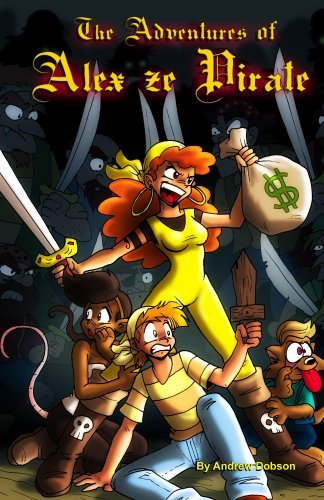
Believe me, I would love to write an in depth analysis of everything wrong with Alex ze Pirate, from the lazy artwork up to even the publication history of this trainwrack. But doing so would take a lot of time and there is one individual part of this I think deserve at least extra attention. Something that in my opinion embodies quite well a lot of things I consider wrong with this comic. So before I am going over Alex in its entirety (and believe me, the day will come) let me just talk within the next few posts about one certain aspect and story of the comic, that genuinely got me to loath this comic to the core: Sam the Cabin Boy and “his” own individual story Dobson drew in three parts around 2010.
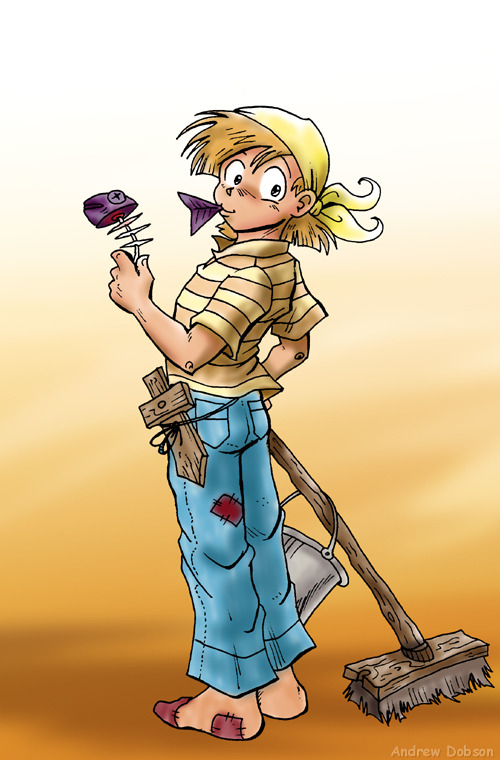
For starters, lets talk who Sam is: Sam is one of the main characters in the comic and actually the first person who joined Alex and Peggy in the initial pages of Legends, the “original” form of Alex ze Pirate.
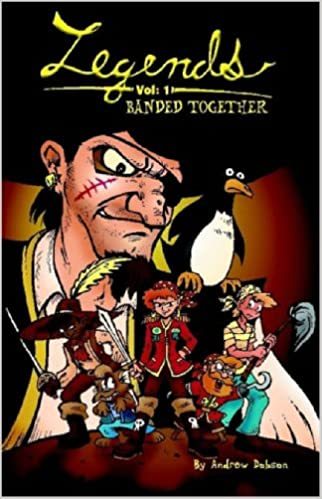
See, back in 2004, Dobson released Alex ze Pirate in form of a single comic volume called “Legends” which features Alex trying to recruit a crew. The thing is around 78 pages thick and based on what I saw pretty terribly paced. For comparison: When Luffy in One Piece got his crew together, he spend multiple volumes and at least three minor story arcs to get Zoro, Nami, Sanji and Usopp to join him. All while also giving us good insight into the kind of people his new crewmates were (especially Sanji’s and Nami’s backstory got to me), defeating the likes of Buggy and Captain Black, meeting Dracula Mihawk and defeating one of the biggest bastards Eichiro Oda ever created in form of Arlong. What is the story how Sam joins the crew? An orphanage organizes an auction and sells kids off. Which I assume was even illegal in pirate times, so kudos for already showing us how despicable the world of Alex ze Pirate is to begin with and how much it deserves to be nuked in some sort of alien invasion.
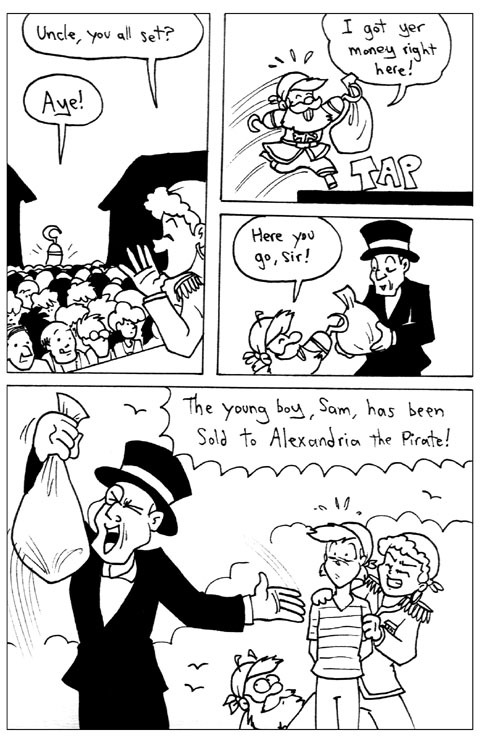
Sam also doesn’t really get anything to do when he is introduced, just helping Alex escape on a small boat. Which is weird because he does not know her at all, she is just some stranger who bought him off and has no means to keep him in check, so why even bother following her and not let the mob get rid of Alex?
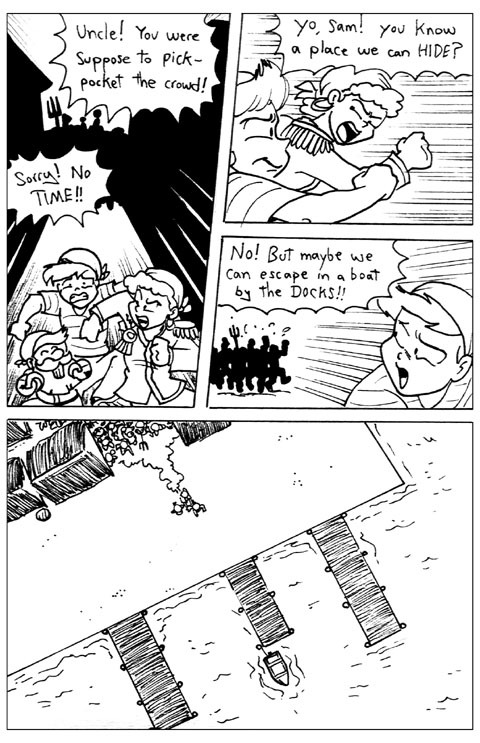
Anyway, I wish I could tell more about Sam’s involvement in Legends, but I don’t have really more than some scans of it in the beginning and near the end. So I don’t know his involvement in the rest of the volume. I also can’t say how he plays out in volume two, because that does not exist at all. Cause for reasons I will never understand, Dobson just abandoned the idea of telling a “coherent” and ongoing story with Alex ze Pirate and instead went to his colored one page comics/strips with it, turning it into what some people called “Garfield with Pirates” (which I consider a genuine insult towards any newspaper comic out there, even something as Boondocks). And the first thing we see of Sam in “classic” Alex ze Pirate?

The perverted dwarf of the crew showing of his shota underwear so that Alex and Sam stop bickering who is the cutest, leaving him embarrassed and humiliated.
Which kinda sums up his role in the comic to a t. Cause this is what Sam is: He is the buttmonkey of the crew. And honestly, I would not have a total problem with Sam being a buttmonkey, if a) he wasn’t it all the time, b) he would actually do something to deserve any form of humiliation and c) if the other characters in this comic itself would not be some of the biggest assholes I have ever seen, who get away with abusing the poor lad.
See, here is the problem: In a crew featuring a choleric homophobic soulless ginger
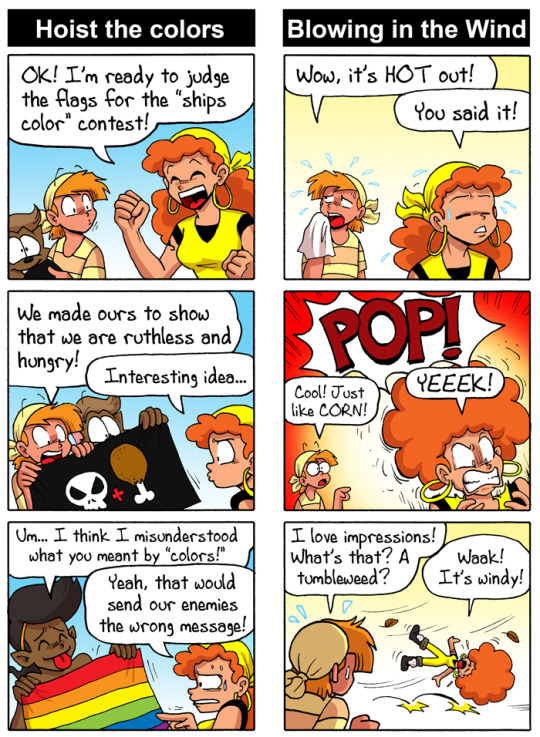
A black rat person who wants to fuck the ginger even without her consent
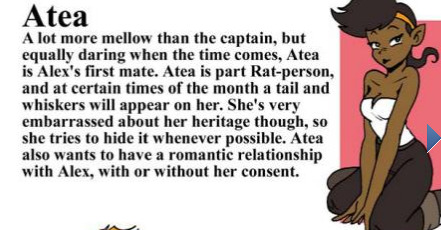
A furry abomination that has the same brain wavelengths as Chris Chan
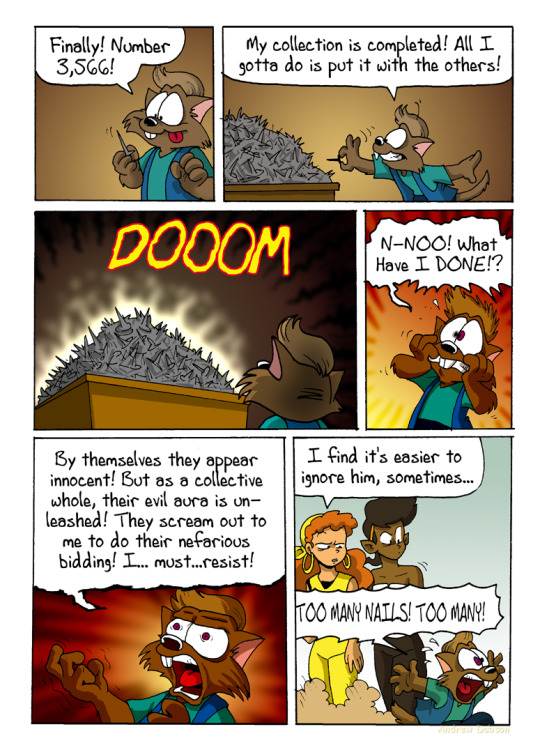
And a perverted dwarf who tries to impersonate Happosai from Ranma 1/2
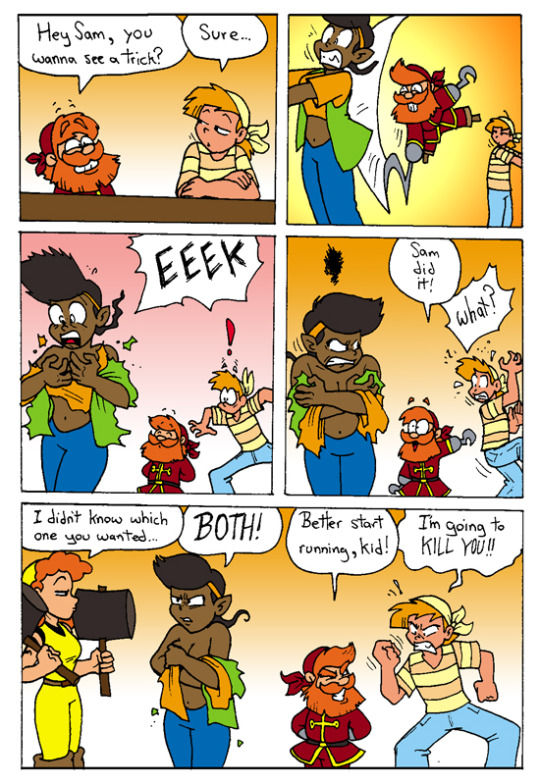
Sam is the only decent person in the entire crew. He works hard, he even questions the morality of his friends at times, he is honest, he is not perverted, almost good to the point of childish innocence and he has a very humble “goal” which is he wants to own his own piece of gold. Not even a big pile of treasure, just one single coin would be enough for him.
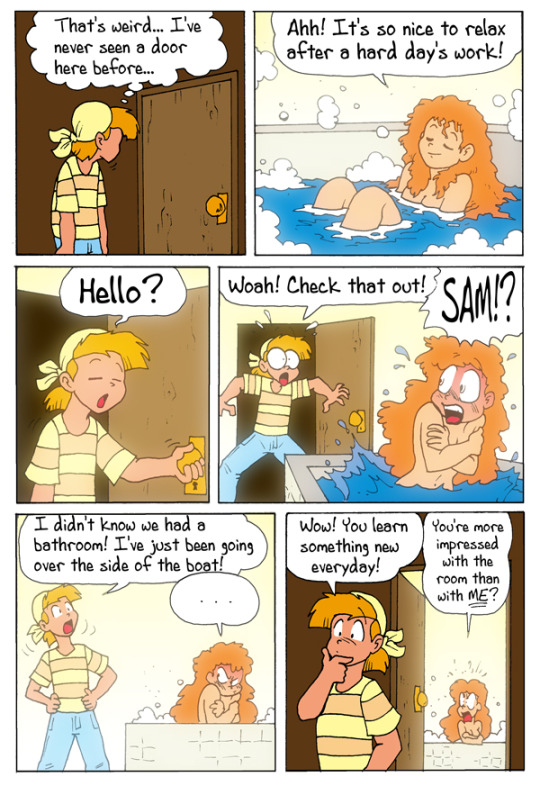
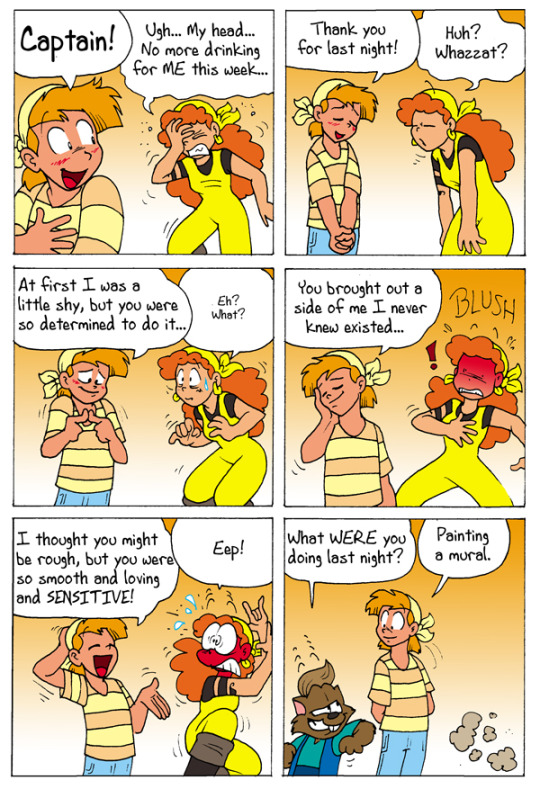
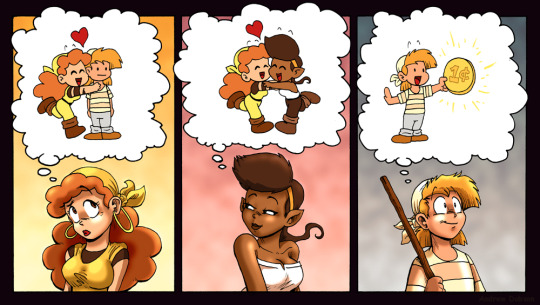
So he is likeable and relatable. In fact, if anything goes by, he may have been one of the most popular ones in the comic. And yet he is the one who gets constantly abused by “fate” and his friends, because as Dobson would say it, he is supposed to be the buttmonkey. There is just one problem: People do not necessarily like buttmonkeys.
I can primarily speak only for myself here, but I hope what I have to say resonates with others too. See, I get it: A character who is the butt of a joke can be fun. Like Daffy in Duck Amuck. But there is a fine line where a character being humiliated for the sake of a joke is fun (and perhaps even deserved because of his own shortcomings or deeds/actions that make the humiliation sort of kharmic, like lets say Johnny Bravo) and a character being humiliated to the point it feels disproportional, unfunny and mean spirited if not outright sadistic, can be crossed. Take Meg Griffin from Family Guy for example whose only “purpose” for existing within the last 12+ years is to get shat on by her family and the writers. People have no idea for a plot with her, so what do they do? Have her father physically and emotionally abuse her, fart in her face for what is supposed to count as a joke and then add additional insult to it by acknowledging that they are only doing this, because they have no other idea for her and think abuse is fun. Let me just tell you from experience, it is not.
And that is essentially what Sam is: He is the Meg Griffin of Alex ze Pirate, used by his creator as the butt of very unfunny jokes, even if he does not deserve any of the things said or done to him. Want to see some examples?
How about the description Dobson gives Sam within the introduction of one of his volumes, showing how little Dobson as the creator even cares for him.
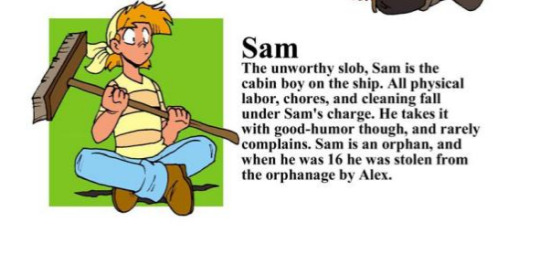
Why is he called an unworthy “slob” if he is the only one who actually works? Shouldn’t a slob be someone like Dobson, who can’t even take care of himself anymore? Also the confirmation that he was kidnapped at the age of 16. And as we have no clarification how much time passed between Legends Vol. 1 and anything afterwards, that means that in a way Alex is a child abuser.
And now, here some examples by the rest of the cast. Like Uncle Peggy framing him for all sorts of his perverted actions and even trying to kill him for no apparent reason?
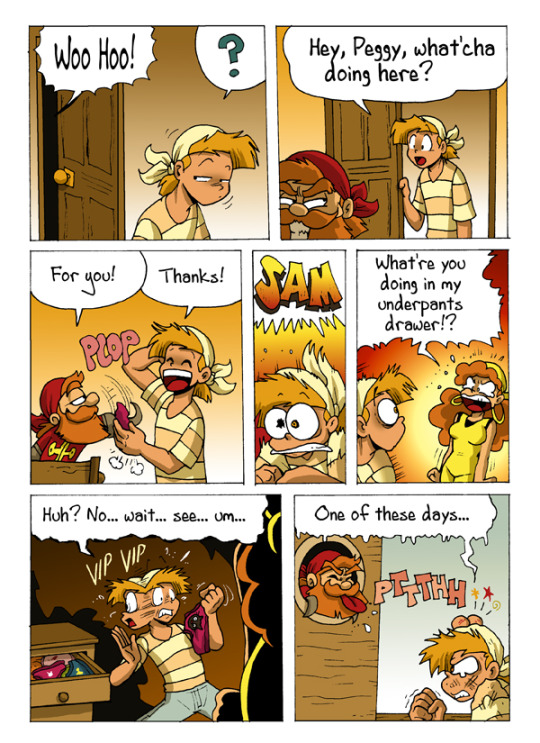
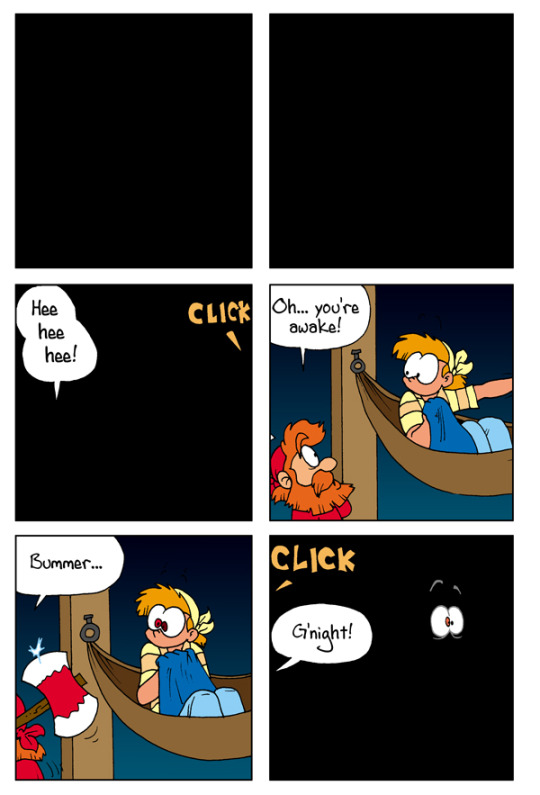
Alex trying to kill him with chicken pox…
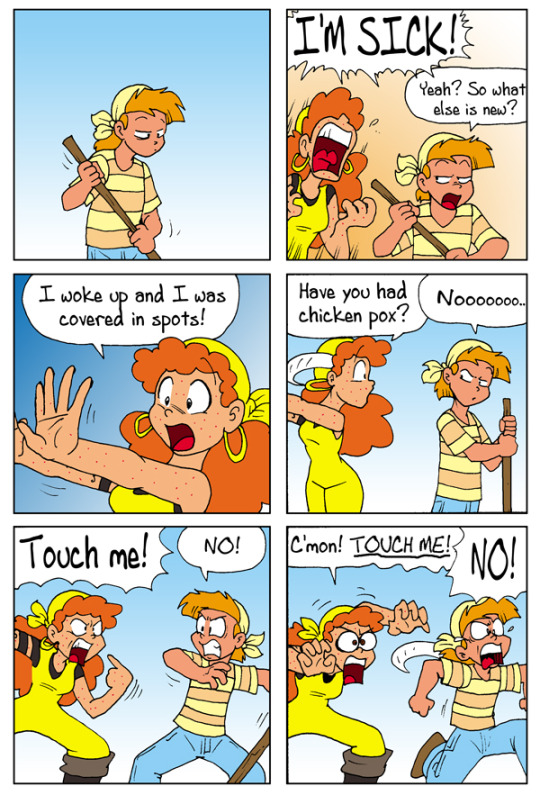
…Destroying all his worldly posessions which is hilarious because he is a poor orphan…

…Essentially describing him as worthless because he was born with an Y-chromosome…
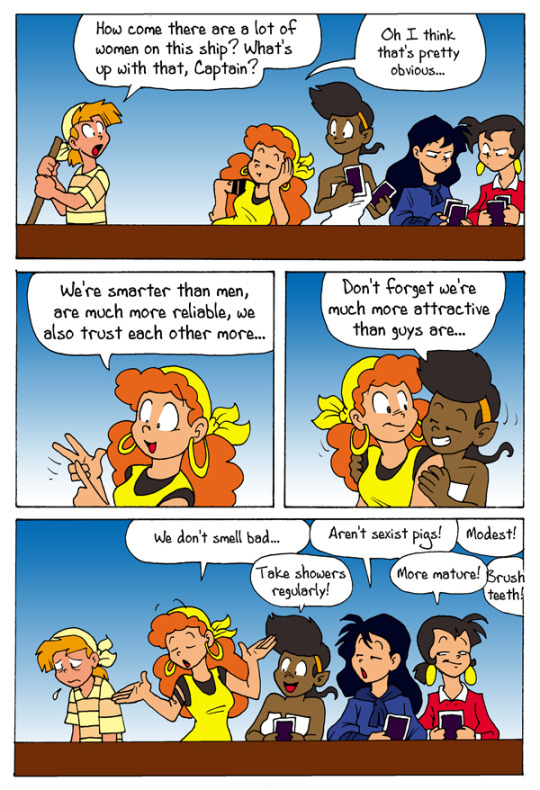
… doing the kind of thing Dobson claims women would never do to man, using their sex appeal to hurt them…
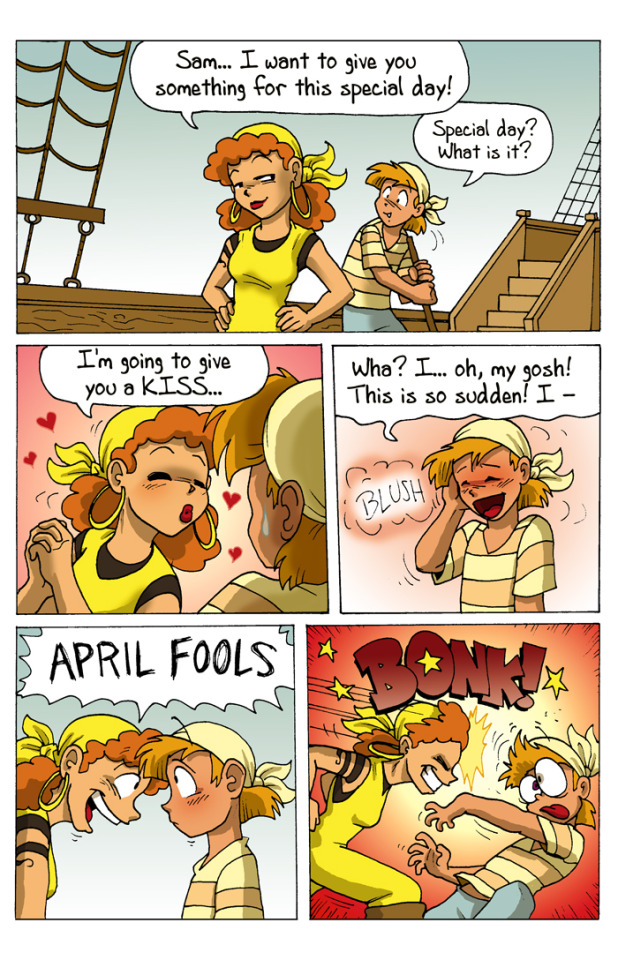
…forcing him to do some unnecessary and rather petty work for her in a physics defying manner (seriously, the way he holds the axe does not compute with how he swings it. Try it out yourself)
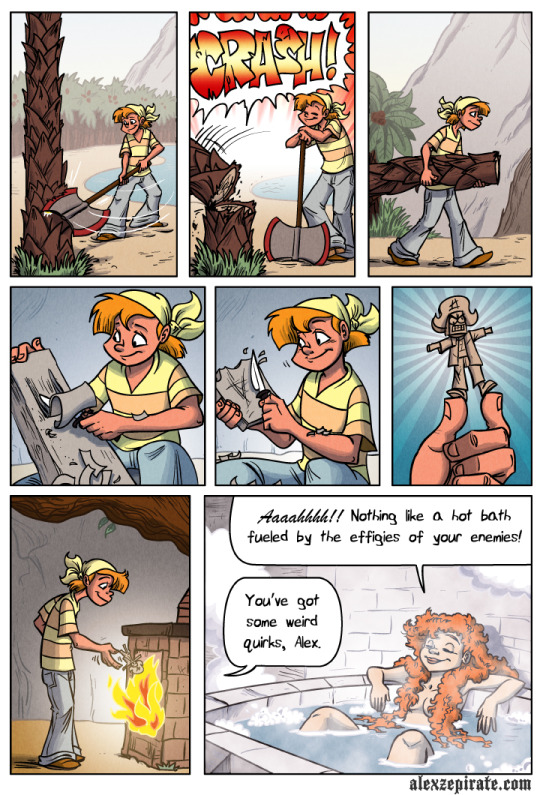
… stealing his food and just being a cruel sadistic cunt to him just because it is fun.
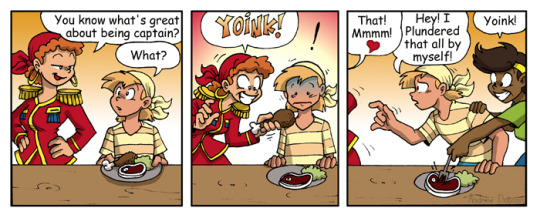
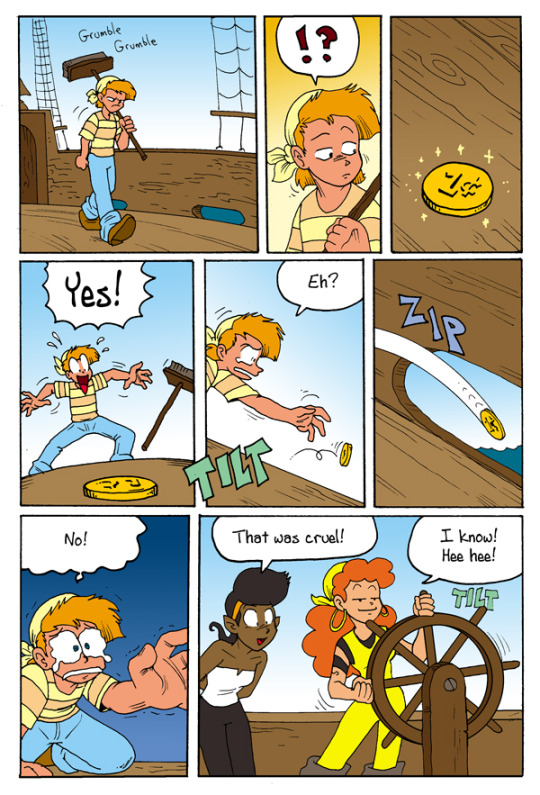
Which is “funny” in so far as that there are a few comics indicating she would jump his dick and ride it like a little pony if she could.
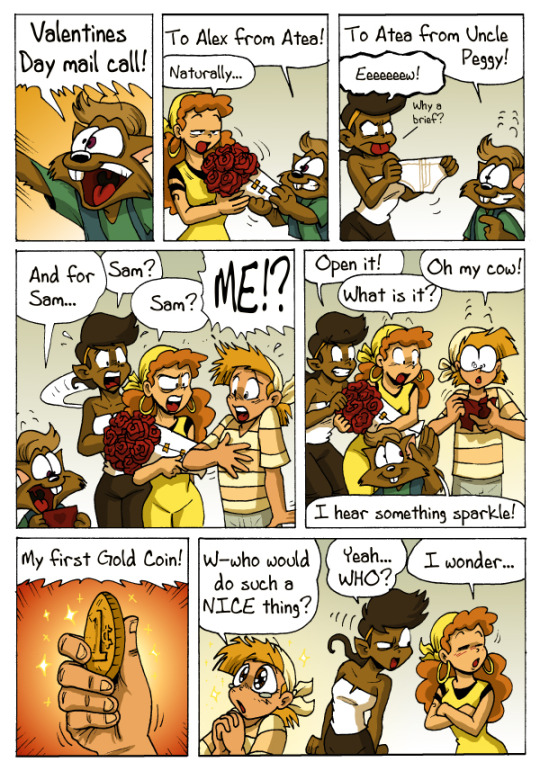
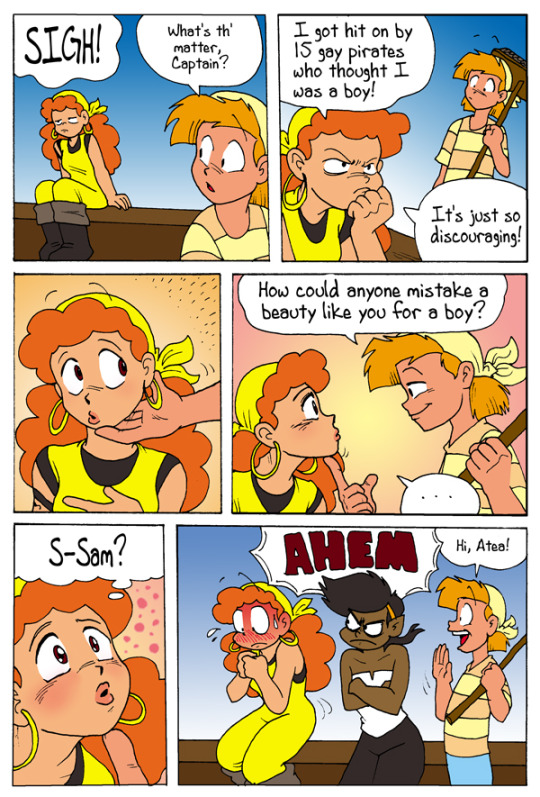
By the way, Talus and Atea are not better. None of them calls Alex out on her bullshit on average, Atea uses Sam to trigger traps in one story arc…
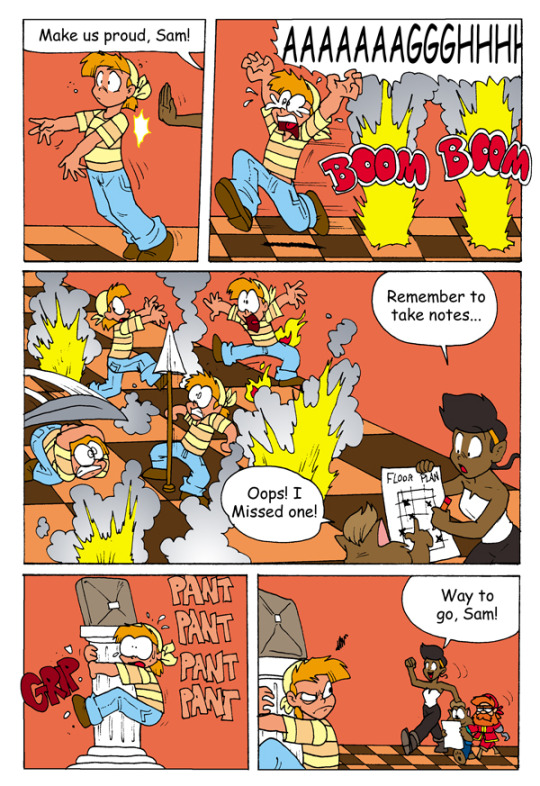
And Talus, the closest to a “friend” he is supposed to have, once for no apparent reason made him dig through his litterbox
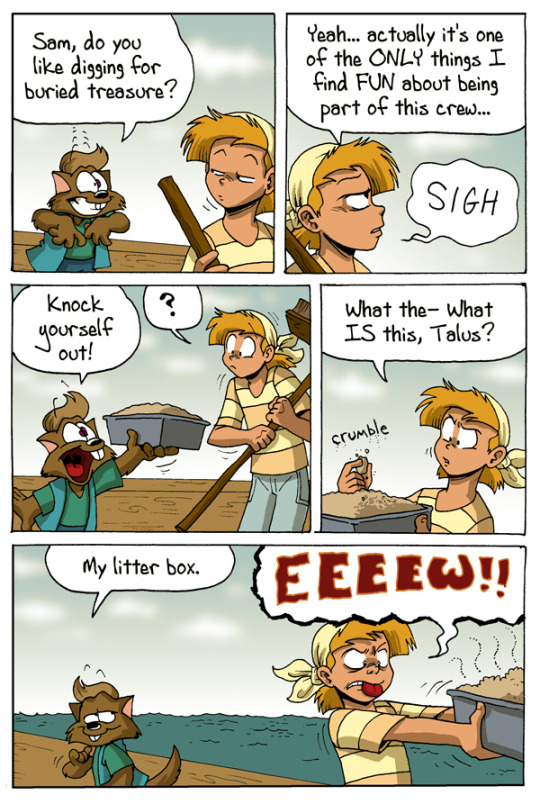
And don’t get me even started when the characters decide to gang up on Sam, to the point he gets sexually harassedor is called to be less worth as a human being than the dirt you find in your belly button
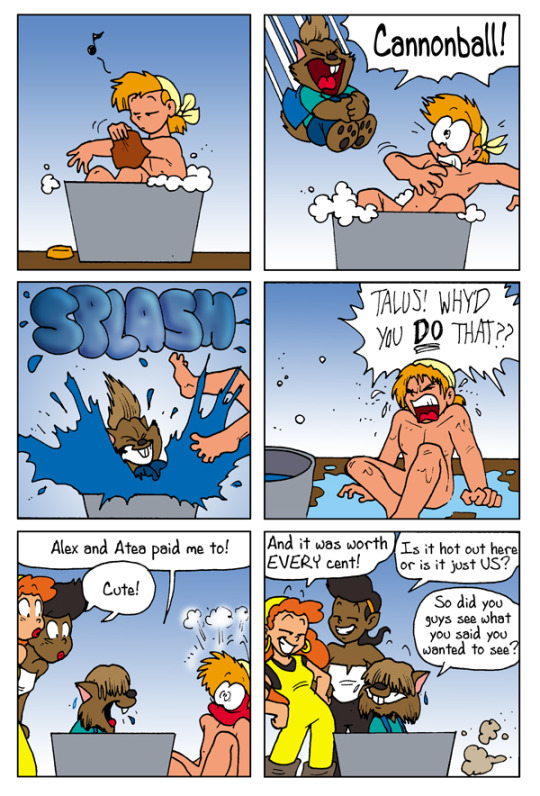
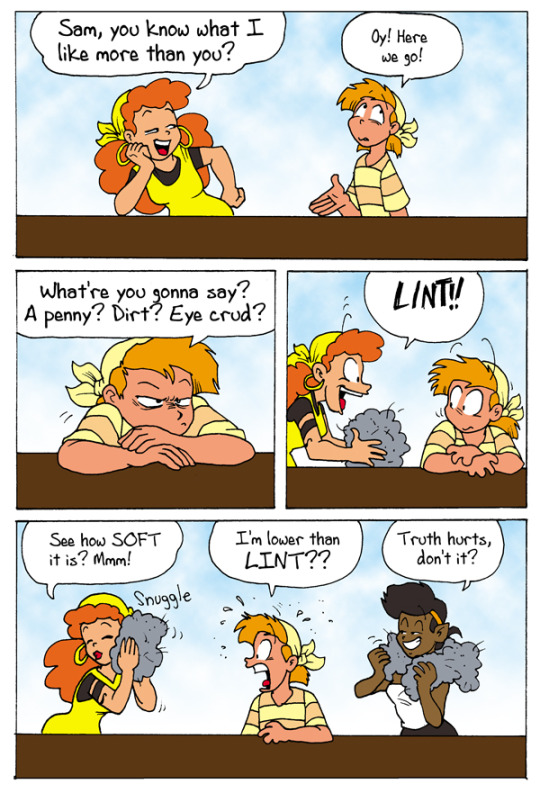
Fuck’s sake, even in fanart everyone gangs up on him, even the freaking big bad of the story everyone is supposed to hate or be afraid of
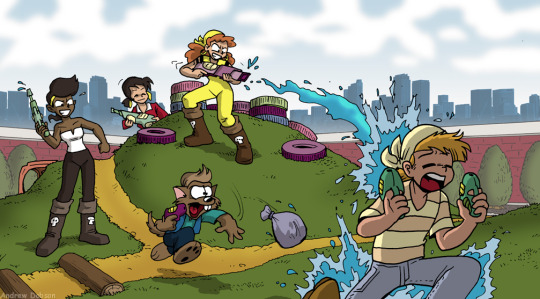
Bottom line, Sam is an abuse victim played for laughs in this comics. And just to clarify, I do not think this was Dobson’s intention. But if the character is undeservingly the butt of jokes for the majority of over 120 strips, it turns nasty. The way Sam is treated, I just find disgusting and indictive of just how unlikable any other character in this comic is to the point I do not want to see this being turned into a proper “franchise”. And I assume others were disgusted by it too, cause Dobson eventually decided to make a story more or less addressing the treatment Sam receives, while also attempting to prove that deep down the assholes with starring roles in this trainwrack care for him. How did this play out? Well, I am going to talk about it, so likely not well. If you want to see the details, grab yourself some popcorn and take a toilet break before we tackle part 2 of this thing.
#andrew dobson#so you are a cartoonist#sjw#comics#comic#webcomic#alex ze pirate#sam the cabin boy#legends#tom preston#disgusting#male abuse#unfunny
113 notes
·
View notes
Text
BL Show Review Series - Until We Meet Again
The next show I am going to review is (spoilers) my favorite BL to date. It’s called Until We Meet Again, and it is fantastic.
Disclaimer that these are my own opinions, and I don’t know where the BL community as a whole stands on these shows. If I disliked a show you loved or visa versa, no disrespect is intended!
MASTERLIST OF BL SHOW REVIEWS
Mild Spoiler Warning and TW: brief mentions of suicide and homophobia

Until We Meet Again Rating: 9 / 10
I’ve put off writing about this show, because I’m finding it hard to articulate all of the reasons why the whole thing works so well. First of all, it needs to be said that whoever did the casting should get whatever the Thai version of an Emmy is, because every person involved in this show is so, so good. The standout, however, is Fluke as the main character, Pharm.
Fluke is, in my humble opinion, unequivocally the best actor in the Thai BL world. So much of the emotional work is done by him, in a show that is very, very emotional, and he carries the weight of the narrative really well. This man can cry on cue, and I swear he can make himself blush on cue too. You believe every second of his performance, and he makes Pharm very likable, relatable, and sympathetic without tipping over into helpless damsel territory.
Part of what makes the character so good is the quiet but firm way that he sticks up for himself. When Alex, the popular drama club president, starts to flirt with him, instead of running to Dean or meekly tolerating it, Pharm smiles politely and rejects him in a way that leaves no room for confusion. And when Dean does something that Pharm is uncomfortable with, Pharm forgives him with the gentle caveat that he never do it again. It’s said kindly, but you understand that Pharm means it, and Dean understands that too.
Anyway, that’s a hundred words just about how much I love Pharm, and we haven’t even talked about the main relationship. See, this is why I haven’t written about this show yet.
A quick overview of the show is that back in the late 80s, two university-aged men named Korn and In fell in love. However, their fathers disapproved, and Korn’s father was a mob boss who had tight control over his son. In despair, Korn kills himself and In, sick with grief, follows.
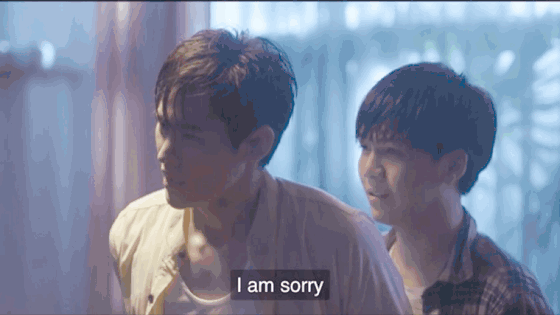
(left: Korn, right: In)
Then, cut to modern times, we meet Pharm and Dean, who we quickly understand are the reincarnations of In and Korn, respectively. It’s Pharm’s first day at university, and while he’s there doing all the introduction stuff, he meets his future best friends, Team and Manaow, and locks eyes with Dean.
Dean and Pharm both feel this connection, and their relationship is the sweetest, softest, kindest thing you will ever encounter in one of these series. Dean is a taciturn third year who is the president of the swimming club. He has plenty of female admirers, but he’s been looking for someone all his life. When he finds Pharm, he knows that his search is over. He is so gentle with Pharm, who is dealing with PTSD from In’s memories. At the same time, Dean doesn’t play any games. He makes it clear that he likes Pharm and wants Pharm to like him back. He never tries to hide his feelings with Pharm or anyone else.

(left: Dean, right: Pharm)
Ohm, who plays Dean, has less to do than Fluke, because Dean is not the primary POV character of the show, and he’s much quieter overall. But what he does well is watching Pharm and touching him like he is the most important thing in the world. He’s open with his affection and never gets hostile or aggressive the way characters often do in these stories. He’s a big guy, but he’s very kind.
Korn and In’s story is told through flashbacks that are mainly meant to mirror Dean and Pharm in the present. It’s hard to watch their happiness when we know how it’s going to end up. Earth plays In, who patiently and insistently chases after Korn. His smile is like sunlight. Seriously, he is a gift, which makes it all the harder to watch him go through so much pain. Korn is much more stoic. I think of all of the characters, he’s the one I had the hardest time connecting with. He keeps a very stern face most of the time, but by the end, it still hurts seeing him suffer.
One of the key things that makes this drama different than other BLs is that it has a genuinely compelling plot. We get to watch as Dean and Pharm navigate their new relationship while trying to piece together what is happening inside their heads. They also need to figure out how much of what they feel for each other is them and how much of it is because of Korn and In’s memories. The story went places I truly wasn’t expecting at times and kept me interested the whole way through.
The supporting characters on this show are also great. The secondary couple is Pharm’s friend Team and Dean’s friend Win. Win is the vice president of the swimming club, and Team is a junior member of the club. They immediately have that playful, fighting vibe between them that is really fun to watch.
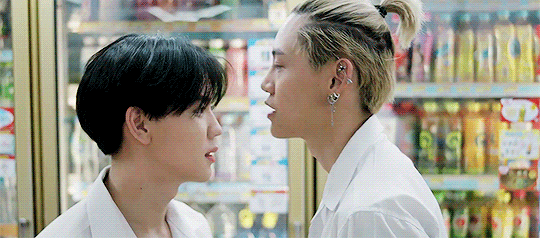
(left: Team, right: Win)
Win’s character has lots of tattoos and piercings. He looks like a bad boy, but just like Dean, he’s actually very nice. He’s more mischievous and outgoing than Dean though. This makes him a better match for Team, who isn’t afraid to match Win’s attitude and return his teasing back at him.
Oftentimes, the secondary pairings bore me a bit, but I loved, loved, LOVED Win and Team. They are getting their own series next year, and I cannot wait for it.
Something else I want to point out about this story is that there are no Evil Female Characters. No clingy ex-girlfriends or scheming, jealous love rivals anywhere to be seen. But there ARE female characters, and they’re all great. Manaow, Pharm’s other best friend, is the main one. She’s played by Thai BL mainstay Sammy. Manaow is loud and friendly and supportive. She also gets her own boyfriend, though I wish we saw more of that relationship (give it to us in the sequel, pleassssse). Dean’s sister Del quickly joins their group of friends as well. Then there’s the less prominent members of Pharm’s cooking club. Female family members who also play big roles in the narrative.
The show isn’t without its faults. The one BLARING example that comes to mind is product placement. Until We Meet Again has the most blatant and annoying product placement I have ever seen. It almost feels like the show is stopping and having the characters give full commercials mid-episode. I refuse to mention the names of the products, but they are highlighted in a ham-handed way that is even more crass when you contrast it with the quality of the rest of the show. The worst one, by far, is at least relegated to a sort of mini-story after the episode. It involves one character encouraging another to go to the sponsored clinic and get cosmetic work done. The whole thing is not just gross but also out of character for both of them. I’ve pretty much erased it from my mind. Capitalism can burn.
The other thing is that occasionally the pacing drags a bit. I enjoyed it, but the director lingers 5-10 seconds too long on some shots, especially those involving eye contact. This is normal for BLs, but not to this extent. There’s an almost-kiss scene that drags on for nearly a FULL MINUTE in an early episode. At this point, I’ve rewatched the show so many times that I know when to hit the skip 10 secs button to move things along at a faster clip. But the first time I watched, I was like, “OK, I get it. They’re looking at each other and remembering events from their past lives. You have thoroughly conveyed this.”
But those are comparatively minor gripes and didn’t detract too much from my enjoyment. Watch this show. Have tissues ready.
And if you’re interested in fanfic, I put together rec lists for multiple BL shows including this one that can be found here and here.
MASTERLIST OF BL SHOW REVIEWS
(Send me an ask if you have a show you’d like me to review - with the understanding that I will be completely honest - or if there’s anything you think I forgot or got wrong in this review.)
#until we meet again#uwma#bl review series#ohmfluke#deanpharm#dean x pharm#bounprem#winteam#win x team#kornin#korn x in#cooheart#kao x earth#thai bl#bl recs
49 notes
·
View notes
Text
Superman & Lois Episode 5 Review: The Best of Smallville
https://ift.tt/3d3qbkS
This Superman & Lois review contains spoilers.
Superman and Lois Episode 5
This is the first episode of Superman & Lois that maybe felt like it was spinning its wheels a little. To be fair, this entire season has been unfolding at what can best be described as a deliberate pace. It’s an understandable decision since the entire concept of this show is meant to take fans of the Superman mythos pretty far out of their comfort zones, so there’s still a lot of heavy lifting that has to get done each week, especially as we get used to the Kent family, the Cushings, the history of Smallville, and more.
cnx.cmd.push(function() { cnx({ playerId: "106e33c0-3911-473c-b599-b1426db57530", }).render("0270c398a82f44f49c23c16122516796"); });
That isn’t to say that “The Best of Smallville” is a bad episode, or a boring one, or even a rote one (it’s way too early for this show to have any kind of real episodic “formula,” other than those big reveals that it saves for the final moments each week). If anything, this shakes things up a little by adding flashbacks to Clark’s teenage years at key moments in the episode. And those, just like everything else relating to Clark’s history on this show, are handled with real care and reverence for everything that has come before. But I can’t help but feel that several of the beats we get in this episode, from Jonathan continuing to lose to the troubled home life of the Cushings, is stuff we’ve already been getting in previous episodes, all while the Morgan Edge story continues to just kind of lurk around the outskirts, just like the character himself.
Fortunately, this is Superman & Lois we’re talking about, and this show’s core four (not to mention its terrific supporting characters) make every moment worth watching. I have already written endlessly about how truly endearing Tyler Hoechlin’s Clark Kent is, and I’ll continue to do so. But there’s one thing Hoechlin does with Clark that I’m not sure I’ve ever seen another Superman actor do quite as effectively, and that’s how he makes Clark’s uncoolness not a put-on or an affectation, but as a genuine component of the “real” Clark Kent.
It’s hard to explain, but hang with me for a minute. It’s generally assumed that any time Clark is being “uncool” or overly earnest about something, it’s part of his “disguise.” And with many actors, especially the legendarily perfect Christopher Reeve, that was absolutely the case. The key to a truly great Clark performance always seems to come in the moments when he lets his guard down, and you realize that this is the “real” person, not the “Clark who has to pretend he isn’t Superman” shine through. Hoechlin does this effortlessly, and as dad-cringe as his entire opening enthusiasm about the Smallville Harvest Festival is, it’s real. He doesn’t have to fake this for his family, it’s really who he is. It’s great and I don’t know how many other leading man types who have played this role over the last 20 years or so who could actually pull this off so easily.
Anyway, that was quite a digression. Sorry about that.
I singled out Jonathan’s struggles this episode for some mild criticism above, if only because we’ve been watching this kid’s life unravel pretty much since the first episode. It is, perhaps, a little TOO convenient that he gets dumped by phone the same moment his brother is setting up his first ever date. And maybe this is the kind of thing they could have saved another episode or so instead of letting it come so soon on the heels of his football struggles.
But both of these kids are just so damn good that it’s tough to fault it. Jordan Elsass makes Jonathan perhaps the most likeable character on this show, even when he should be (as Sarah points out) a completely insufferable jerk. I know there’s speculation out there that Jonathan will be driven to villainy by his pretty ordinary teenage struggles, and I just don’t see it happening. These are both good kids, and even when they screw up, it’s pretty clear that their heads are screwed on straight. I’d just like to see Jonathan catch a break soon, though.
Read more
TV
The Flash Season 7 Episode 4 Review: Central City Strong
By Lacy Baugher
TV
Batwoman Season 2 Episode 8 Review: Survived Much Worse
By Nicole Hill
They’re definitely playing the long game with Jordan, too, and Alex Garfin manages to imbue him with the almost wild-eyed wonder of someone who really just can’t believe his good luck…all without either lording it over or condescending to his suddenly unlucky brother. I’ve always felt that empathy is a secret Kent superpower, and Jordan’s got that by the boatload.
Lois and Chrissy are a surprisingly delightful pairing, and so far this show has managed to resist the rest of the Arrowverse’s tendency to “do a journalism” here, even as we see these two starting to dig a little deeper into whatever Morgan Edge is up to. Still, the fact that Lois literally can’t even write for the Smallville Gazette at the moment isn’t doing my or anyone else’s misgivings that they’re sidelining her any favors. It’s great to see Lois in these other contexts, and Elizabeth Tulloch is nothing short of the best screen Lois this century, but I can’t help but think that there’s something being missed with her story so far. (That being said, her thoroughly annoyed “go faster” to the boys at the Harvest Festival was a terrific, and intimidating fun moment.)
Those flashback sequences, though! Just as I love it that Jon, Jordan, and Sarah are all actually believable as teenagers (coughSmallvillecough), I like that they fully leaned into awkward 15-16 year old beanpole Clark and not some already filled out heartthrob type. Clark leaving home THIS early feels like a slightly new wrinkle for the Superman mythos overall, and I’m especially interested in seeing if we’ll see how some of this developed down the road.
I look forward to seeing Wolé Parks’ Captain Luthor continue to develop, but it would be nice to see if they give him enough screen time soon to give us anything beyond “seething, barely contained rage.” I’m also very curious to see if there’s any nuance they can build into his Lois twist, so that she doesn’t just become another object of fixation for the character. Similarly, it’s time for this story to show us a little more of its hand with the Morgan Edge/X-Kryptonite stuff, because sometimes a slow burn is just a fizzle, y’know?
I appreciate this show’s commitment to its family drama first storytelling, and I get that if we show Superman in action too much it will a) not be as special and b) eat up the FX budget so the moments we DO get won’t look quite as good. But I’d like to see a little more, and I certainly hope that more of Superman’s rogues’ gallery becomes open for business at some point. Yes, I get it, so many of those were utilized on Supergirl already, and I don’t want this show to fall prey to the “villain of the week” tedium that The Flash occasionally slips in to. I’m sure there’s some middle ground that won’t lose what makes this show stand out from its peers.
Metropolis Mailbag
Right out of the gate in this episode we learn that Smallville was established in 1949. It certainly was! While it was clear early in the Superman mythos that he wasn’t from Metropolis, and had grown up on a farm, and Superboy was established as a character in 1945, it wasn’t until 1949 that Clark’s hometown actually got it’s name, in the pages of Superboy #2.
Martha Kent giving Clark the sunstone crystal is a new one. Usually, so much of Clark learning about his heritage is tied exclusively to his father(s). Either the crystal itself calls to him (in which case, it’s Jor-El) or it’s Jonathan telling him the story of how he was found. This is the first time I can think of where it’s Martha really speeding Clark along on his journey to becoming Superman, and it’s about damn time.
On that note, their conversation about Clark being “sent here for a reason” is very much a nod to Glenn Ford’s Pa Kent talking to Jeff East’s young Clark in Superman: The Movie.
I assume he’s leaving here because the sunstone crystal told him to head north so it can build the Fortress of Solitude, but let’s ALSO not forget that Supergirl established early on that Clark was a member of the Legion of Super-Heroes in the future, so…this might be the time!
Spot anything I missed with these Superman Easter eggs? Let me know in the comments!
The post Superman & Lois Episode 5 Review: The Best of Smallville appeared first on Den of Geek.
from Den of Geek https://ift.tt/31b6lyu
6 notes
·
View notes
Note
5, 10, 14, 18
5. What is the perfect environment for you to write in?
all by myself, or when Alex is busy working; dictating into my phone while driving; pacing and muttering like a crazy person; doing chores and then sprinting back to my laptop when inspiration for the next two sentences strikes, because apparently motion is the key to writing.
10. Do you enjoy writing dialogue, exposition, or plot the most?
answered!
14. If you were stuck on a desert island with only two characters, which would you pick?
ooohhh....Malachi/Cahan would be the best survivalists, I feel like, as well as being pretty chill, so I’d say them. I personally am hilarious, so I don’t need Mandel, Ifan, or Rhys Windlow, but I am not a healer type, so I’d say Priya.
...and i give decent relationship advice, so Priya and Cahan it is XD
18. What is a line/scene you’re really proud of? Give us the DVD commentary for that scene.
because we all know I’m extremely proud of literally everything I write, I asked you what you’d want to hear about and you chose this one!
~~~
When Cahan opened his eyes, he was lying on the floor. His head hurt horribly. His back burned. He hadn’t even thought about the beating he’d taken when he had attacked, but the stripes were making themselves felt.
He lay still for a while, drifting. Some part of his consciousness was assessing his injures (reopened scabs on his back, what was most likely a black eye, an assortment of bruises, and his ribs hurt), but most of him was absorbed in dreamily watching dust motes drift in the sunlight.
Eventually, he became aware that Tiras was watching him. The Sarkinian sat perched on his desk. The chain that connected Cahan’s collar to Tiras’s belt trailed on the floor between them. Tiras had one hand to his own neck, rubbing gently where the chain had dug in. He couldn’t understand Tiras’s expression. It was thoughtful, almost sad.
“You’re in love with her,” he said.
Slowly, painfully, Cahan dragged himself into a sitting position and leaned his pounding head against the wall. Even if he weren’t distracted by pain, he doubted he would have understood who Tiras was talking about.
“Priya. You’re in love with her. I saw your face when Kovar carried her out. And here I thought I’d seen you at your most desperate when you were begging for that worthless brother of yours.”
Dimly, Cahan knew he should argue somehow, pretend ignorance. Something. He simply sat, looking back at Tiras. He was too tired to feel alarmed. Alarm wouldn’t change anything. Tiras had killed Mandel for flirting with Tressa. Of course he would kill Cahan for loving Priya, even if that love were nothing more than a private and personal tragedy that could never be realized.
“Does she have any idea?”
He mustered up from somewhere the strength to feel a little angry. How dare Tiras look at him with pity? How dare he ask about Priya as if he had any right to Cahan’s inner life?
Tiras nodded, as if Cahan’s frown were all the answer he needed. “Of course not. I should’ve guessed, honestly. You can’t communicate and you’re not one for dallying. Honest courtship or nothing, hmm? It’s probably just as well for your own sake, Landless. The way she leaped in front of Kovar…Let’s just say you wouldn’t have had much of a chance even if you could talk.”
~~~
I liked writing this opening because of the challenge of capturing that dreamy, drifty feeling of coming back to consciousness. Granted, in this case it’s not a fun drifting, since Cahan is waking up from being beaten unconscious, but I suspect most people have experienced that moment of waking up slowly and focusing on nothing in particular, until you notice something that makes you aware you’re fully awake. Personally, I think writing should always tap into something relatable in some way, to keep people grounded. Sometimes it’s as small as waking up.
I also enjoyed sprinkling in another hint about Tiras and Cahan’s past dynamics--not really friendship, but certainly more friendly. There’s an element of “I know you and I know how you think” in this scene that runs deeper than recognizing each other’s battle tactics.
This also incorporates some of the narrative payoff from killing Mandel (sorry, y’all): Mandel’s murder for loving Tressa highlights the danger Cahan is in for loving Priya, even though it’s not something he expects ever to be anything more than unrequited pining. It also conveys (not that y’all needed telling) how much he loves Priya, that Tiras considers his fear for her life to outstrip even his love for his own brother, for whom he sacrificed his voice. And now that I’ve phrased it like that, you’ll appreciate the consistency of Cahan’s sacrificial nature.
I don’t really know why writing Cahan as just too tired to feel anything was satisfying. Maybe because it lends to the overall quietness of the scene (almost said “muted feeling,” but that seemed a little on-the-nose). It balances out the action of the preceding chapters, eases the tension in one way while pulling it taut in another, and let’s be real, appeals to the whump side of me.
And I love having the villain of the story express that Priya isn’t aware of Cahan’s love because Cahan has tried not to make it known to her. I love that he knows how honorable Cahan is (won’t express feelings he can’t reasonably act upon, lest he put Priya in an uncomfortable position), that he can read Cahan’s facial expressions so accurately, and that the taunt he chooses to level is unintentionally ironic, since readers know Priya broke up with Ifan the day before.
okay and yeah, the recurring “everybody can see how much Cahan loves Priya except Priya” is kind of entertaining to write.
7 notes
·
View notes
Text
June 29th-July 5th, 2020 CTP Archive
The archive for the Comic Tea Party week long chat that occurred from June 29th, 2020 to July 5th, 2020. The chat focused on Without Moonlight by Tantz Aerine.

Featured Comment:

Chat:
Comic Tea Party
BOOK CLUB START!
Hello and welcome everyone to Comic Tea Party’s Book Club~! This week we’ll be focusing on Without Moonlight by Tantz Aerine~! (https://withoutmoonlightcomic.com/)
You are free to read and comment about the comic all week at your own pace until July 5th, so stop on by whenever it suits your schedule! Discussions are freeform, but we do offer discussion prompts in the pins for those who’d like to have them. Additionally, remember that while constructive criticism is allowed, our focus is to have fun and appreciate the comic! Whether you finish the comic or can only read a few pages, everyone is welcome to join and chat with us!
DISCUSSION PROMPTS – PART 1
1. What did you like about the beginning of the comic?
2. What has been your favorite moment in the comic (so far)?
3. Who is your favorite character?
4. Which characters do like seeing interact the most?
5. What is something you like about the art? If you have a favorite illustration, please share it!
6. What is a theme you like that the comic explores?
7. What do you like about the comic’s story or overall related content?
8. Overall, what do you think the comic’s strengths are?
Don’t feel inspired by the prompts? Feel free to discuss anything else that interested you!
snuffysam (Super Galaxy Knights)
I really like the flash forward aspect of the beginning - keeping the scene in the back of your mind really helps keep things tense as you see the story build towards the scene we see at the start.
(it also helps with the tone - it would be pretty jarring to go from kids stealing food from trucks to the scenes where bodies start dropping if we hadn't established that dark tone early on)
One thing I like about the comic is how the text colors switch based off languages - blue is greek, black is german, red is english, and i believe green is italian. Really makes the language switches easier to keep track of in the back of your head.
I like the comic's theme of... "your actions have consequences", essentially. There are dozens of moments where something bad happened because of one character's action or lack of action, and it's a matter of... when there are so many factors, who should be held responsible for these bad events?
RebelVampire
I like that the beginning of the comic is...more light-hearted despite the situation? I mean it's tragic and I don't mean to paint the situation lightly, but it's also kids and kids are like beacons of hope. So despite it all there were happy smiling faces. Before the chaos descended. My favorite moment in the comic so far was probably when Basil was rescuing Fotis and Wolff decides to let them go. It was a rare moment of humanity where there was no whose side is whose. Just two people doing a bro favor because neither thought a child deserved to be tortured. My favorite character is Basil. Basil really is just the down-to-earth dude he kind of finds that balance between doing what's right but with principle. And he also gets going when the going gets tough. And I'm sure nothing ever bad happened to him in this comic. My favorite characters interacting are probably Fotis and Martha right now. I like this dynamic that they're brought together by tragedy. So it's kind of interesting to see that bond, while also kind of experiencing this weird age gap where even though Fotis is much younger, he grew up almost instantly cause of tragedy. Something I like about the art is just kind of the grim color palettes. The comic is not overly bright, and I think this choice really enhances the grim situation of the comic. It also adds more of a sense of realism because WWII is serious business and was not fun at all for anybody. For themes, I love that the comic kind of explores demonization vs. humanity, especially through Wolff. It is always extremely to demonize the side you're not on, and we see Wolff both do this himself and be a recipient of it. And the comic really wants us to ask are they monsters, or are they still, unfortunately, humans doing really shitty things.
As for the comic's overall story, I love that not only is it historical in its setting, but just that the comic really throws no punches. You have people dying in gruesome ways, torture, espionage, double agents, greed, etc. Just like everything you'd expect regarding war. In regards to strengths, honestly, what I just said above. So many stories are really, really terrified to actually go deep into that grim reality that is war. And even fewer are willing to show that war very rarely has heroes since at the end, it's people killing people which is not cool. And I think this really makes the comic stand out since there are parts that are gonna stick with me for years.
Comic Tea Party
DISCUSSION PROMPTS – PART 2
9. What is your takeaway in regards to the comic’s themes about war and the horrors and tragedy that happen because of it? In regards to these themes, how do you feel about Arthur Wolff, and do you think it��s possible for him to be redeemed and/or at least forgiven?
10. What do you think the comic has to say about survival and hope, especially when humans are faced with the most horrid of circumstances? What moment stood out to you the most regarding this? Also, who do you think will survive the story?
11. Do you think anything will actually happen to Orestes in regards to his actions so far? If so, what unintended affects might occur because of whatever does happen? Additionally, what do you think will happen to his contact, Iris?
12. How do you think the events of the story will continue to change Fotis, and will it be for better or for worse? What about the other children? Given the historical base, what do you think they’ll even do once the occupation ends?
Don’t feel inspired by the prompts? Feel free to discuss anything else that interested you!
RebelVampire
My takeaway from the comic is that war sucks, nobody wins, everyone suffers, and that even good people do some terrible stuff in the name of survival. However, within all that, we're all essentially human and have the capacity for good. Which is why I feel Wolff is an important character, since he's that shining beacon that reminds us that people on the worst side of history possible can still take a step back and go, "Wait a second." As for redemption and forgiveness, I think this is a yes an no. Can he redeem and forgive himself as far as he's personally concerned? Maybe someday. Will others? Probably not in a million years. In contrast to the above, I think that the comic also has strong messages that, even in the face of desperation, humans, as a whole, have a tendency to fight and that, much like everybody in Star Wars, will always have hope. As for the moment that stood out to me the most, I think it was actually the beginning when the kids are risking everything to get supplies. They know it's dangerous, and yet they persevere and don't give up despite being who'd you think would give up first. As for who will survive, maybe Alex cause Alex is toeing the line of safety and staying out of the spy drama. I think Orestes still won't be dealt with for a while, and if anything, will be the victim of vigilante justice because someone didn't want to wait for even a sham trial. I think that they won't realize in his traitorous ways though he really did help out, and will find themselves more at odd with the Nazis. As for Iris, she probably gonna die. Cause that's what happens when you play double agent. I think the events of the story really aren't gonna do good for Fotis, and, at the very least (and assuming he's not dead), he's going to be bitter and have a ton of PTSD. Probably the same for all the children, and I think overall they'll just feel lost once the occupation ends cause normalcy forms fast.
Tantz Aerine (Without Moonlight)
Thank you so much for all the thoughtful analysis and commentary @RebelVampire ! I'm so glad that you have found all these themes in my story
Comic Tea Party
DISCUSSION PROMPTS – PART 3
13. What are you most looking forward to seeing in regards to the comic?
14. Any final words of encouragement for the comic?
Don’t feel inspired by the prompts? Feel free to discuss anything else that interested you!
RebelVampire
I am most looking forward to seeing if Fotis has some epiphany about the horrors of the path he's on. Right now I kind of think he's just kind of...going through the motions and acting mostly on anger. And so I'm interested to see if this will be the case throughout the rest of the story or if at some point his brain stops for a moment and goes "Hey wait a minute these are some pretty serious implications." I think either could change how his character development proceeds. My final words are that I admire this comic's bravery and risks. A lot of creators don't want to write about things like WWII because it's still a little too close to home and painful. But I think these topics are important to show with historical fiction cause not only is it an opportunity to teach about lesser known history in greater detail, but an opportunity to otherwise humanize an event that comes off different when you're just reading facts in a book. So bravo to this comic for doing that.
Tantz Aerine (Without Moonlight)
@RebelVampire Thank you so much! You honour me. Researching this comic has been both a revelation and a painful affair. As for Fotis, you're very right he IS very angry and very grieved at this point in time. We'll see how he will be soon! I can't begin to say how much your words warm my heart thank you again.
Comic Tea Party
BOOK CLUB END!
Thank you everyone so much for reading and chatting about Without Moonlight this week! Please also give a special thank you to Tantz Aerine for volunteering the comic and creating it! If you liked Without Moonlight, make sure to continue to support it via some of the links below!
Read and Comment: https://withoutmoonlightcomic.com/
Tantz’s Patreon: https://www.patreon.com/withoutmoonlight
Tantz’s Ko-Fi: https://ko-fi.com/tantzaerine'
Tantz’s Twitter: https://twitter.com/TantzAerine
#ctparchive#comics#webcomics#indie comics#comic chat#comic discussion#book club#bookclub#webcomic bookclub#webcomic book club#comic tea party#ctp#without moonlight#tantz aerine
1 note
·
View note
Text
Ghostlight Review: A Journey Through Grief and Healing

Ghostlight directed by Kelly O'Sullivan and Alex Thompson from a screenplay by O'Sullivan, is a contemplative drama that delves into the profound themes of grief, guilt, and the healing power of art. The film stars Keith Kupferer, Dolly de Leon, Katherine May Kupferer, and Tara Mallen, portraying a family grappling with the aftermath of a tragic loss. The Story: A Family Shattered by Tragedy The narrative centers on Dan Mueller (Keith Kupferer), a construction worker struggling to cope with his son Brian's suicide. Dan's life spirals into chaos, marked by stress, the disciplinary issues of his teenage daughter Daisy (Katherine May Kupferer), and a wrongful death lawsuit against Brian's ex-girlfriend, Christine Hawthorne. Kupferer's portrayal of Dan captures the raw, often unspoken pain of a grieving father, making his character deeply relatable and human. The story centers on Dan Mueller (Keith Kupferer), a construction worker struggling with the aftermath of his son Brian's suicide. Dan's life is a chaotic whirlpool of stress, intensified by the disciplinary issues of his teenage daughter Daisy (Katherine May Kupferer) and a wrongful death lawsuit against Christine Hawthorne, Brian's ex-girlfriend. The weight of his grief and guilt is palpable, coloring every aspect of his interactions and decisions. Kupferer's portrayal of Dan is nuanced and deeply human, capturing the raw, often unspoken pain of a grieving father. https://www.youtube.com/watch?v=R1TycuGX4Mw The Good: A Journey Through Grief and Art Dan's life takes an unexpected turn when he meets Rita (Dolly de Leon), an actor at a community theater. Rita invites Dan to read for the role of Lord Capulet in their upcoming production of Romeo and Juliet, setting him on a transformative journey. De Leon's Rita adds warmth and eccentricity to the film, and her interactions with Dan are among the film's most compelling moments. Daisy, once an actor, becomes integral to Dan's healing process. Initially reluctant, she finds herself drawn back into the theater world, which offers her a semblance of connection and purpose. Katherine May Kupferer's performance as Daisy is a standout, skillfully balancing teenage angst with deep loss. The evolving father-daughter relationship provides some of the film's most poignant scenes. Sharon (Tara Mallen), Dan's wife, adds another layer of complexity to the story. Her attempt to cope by building a garden over the site of Brian’s suicide contrasts sharply with Dan's methods, creating familial tension. Mallen's portrayal captures the desperation and helplessness of a mother dealing with her grief. One of Ghostlight's strengths is its portrayal of art's healing power. The theater serves as a sanctuary for Dan, offering a space to confront his pain and find catharsis. The scenes of Dan rehearsing and performing in Romeo and Juliet are beautifully intertwined with his personal journey, adding depth to the film. Visually, the film employs a muted color palette and effective use of lighting and shadows to reflect the somber mood. The theater scenes, in particular, stand out for their intensity and the magic of live performance. The supporting cast, including Hana Dworkin, Tommy Rivera-Vega, Alma Washington, H.B. Ward, Dexter Zollicoffer, Deanna Dunagan, and Francis Guinan, enrich the narrative with their unique contributions. Ghostlight powerfully explores the varied ways individuals cope with grief, illustrating that healing is a complex and personal journey. The Bad: Pacing and Dialogue Issues While Ghostlight resonates emotionally, it is not without flaws. The pacing can be uneven, with some subplots feeling underdeveloped. Additionally, there are moments where the dialogue comes off as stilted and overly theatrical, detracting from the film's naturalistic tone. Overall: A Thought-Provoking Drama Ghostlight is an emotionally resonant film, thanks to strong performances and thoughtful storytelling. Keith Kupferer anchors the film with a portrayal that is both raw and tender, supported by excellent performances from Dolly de Leon and Katherine May Kupferer. The film handles themes of grief, guilt, and the redemptive power of art with sensitivity and insight. Despite its flaws, Ghostlight offers a compelling look at a family's struggle with loss and their journey toward healing. It is a poignant reminder of the power of storytelling, both on and off the stage, to heal, connect, and transform. Read the full article
0 notes